Entry Requirements
All visitors must hold a passport or a valid travel document for travel to Macao.
All visitors are required to have a visa except nationals of countries which are exempted from a visa or entry permit. For more information on “Visa” and “Entry Permit” Exemption, please visit the website of the Macao Immigration Services of Public Security Police Force: www.gov.mo/en/services/ps-1474/ps-1474b/
A Macao visa can be obtained through the Embassies / Consulates of the PRC and should be used within its validity. Visitors may also apply for an entry permit or visa upon arrival at the immigration checkpoint. However, visitors from certain countries are required to obtain a visa in advance before their trip to Macao. For more information, please visit the website: www.fsm.gov.mo/psp/eng/psp_top5_3m.html
There are three types of entry permit (i.e. Visa-upon-arrival) : Individual - MOP100 (MOP50 for children under the age of 12) Family Passport - MOP200 Group - MOP50 per person for groups of at least 10 people organized by a single travel manager and presenting a collective travel document
The above information is for reference only. For further information on entry formalities, please contact the Border Control Department of Public Security Police Force at Tel: (Macao area code) +853 2872 5488 or email: [email protected] , or visit their website: www.fsm.gov.mo .
All visitors entering Macao must go through Customs clearance and declare any dutiable commodities exceeding duty-free quotas. To find out more details about dutiable commodities and latest duty-free concessions, please visit the Macao Customs Service's website at: www.customs.gov.mo .
According to the provisions of the Law, passengers arriving at Macao carrying cash or CBNIs, such as traveller's cheques, cheques, bills of exchange, money orders and promissory notes, with value of or exceeding MOP 120,000.00, should use the Red Channel with a completed declaration form and make a declaration to the Customs officer. Passengers leaving Macao need to disclose truthfully the amount of cash or CBNIs carried when asked by a Customs officer, or they shall be liable to a fine of MOP 1,000.00 to MOP 500,000.00. Travelers who have a layover in Macao SAR and transit to another destination have no obligation of declaration. For more details, please visit the Macao Customs Service's website: www.customs.gov.mo/cn/customs6.html
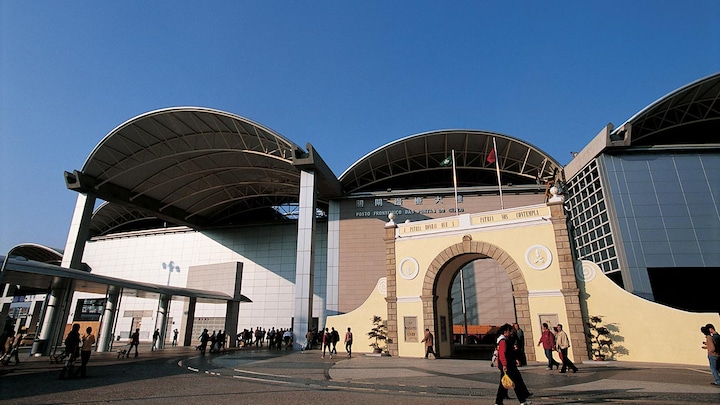
Passenger Service Fee
Airport Security Fee
For more information please visit website of Macau International Airport .

Cookies on GOV.UK
We use some essential cookies to make this website work.
We’d like to set additional cookies to understand how you use GOV.UK, remember your settings and improve government services.
We also use cookies set by other sites to help us deliver content from their services.
You have accepted additional cookies. You can change your cookie settings at any time.
You have rejected additional cookies. You can change your cookie settings at any time.
Register to vote Register by 18 June to vote in the General Election on 4 July.
- Passports, travel and living abroad
- Travel abroad
- Foreign travel advice
Entry requirements
This advice reflects the UK government’s understanding of current rules for people travelling on a full ‘British citizen’ passport from the UK, for the most common types of travel.
The authorities in Macao set and enforce entry rules. If you’re not sure how these requirements apply to you, contact the Chinese Embassy in the UK .
COVID-19 rules
There are no COVID-19 testing or vaccination requirements for travellers entering Macao.
Passport validity requirements
Your passport must have an ‘expiry date’ at least 90 days after the date you leave Macao.
Check with your travel provider that your passport and other travel documents meet requirements. Renew your passport if you need to.
You will be denied entry if you do not have a valid travel document or try to use a passport that has been reported lost or stolen.
Visa requirements
Macao is part of the People’s Republic of China, but it remains a Special Administrative Region (SAR) with its own immigration controls.
You can stay in Macao for up to 6 months without a visa.
To stay longer (to work or study, for business travel or for other reasons), you must get a visa before arrival. Check which type of visa you need with the Macao Immigration Department .
Travelling through Macao to China
If you plan to travel through Macao to mainland China on a British passport, you must get a Chinese visa before you arrive at the border. If not, you could be fined or detained by the mainland Chinese authorities.
If you enter and leave Macao through mainland China, you must get a double or multiple entry visa to re-enter mainland China.
The mainland Chinese authorities may carry out thorough checks at border crossings, including your electronic devices.
Vaccination requirements
To enter Macao, you must have a certificate to prove you’ve had a yellow fever vaccination if you’re coming from a country listed as a transmission risk .
For full details about medical entry requirements and recommended vaccinations, see TravelHealthPro’s Macao guide .
Accommodation
You must stay in licensed accommodation. You could be fined up to 3,000 Macanese pataca (£300) if you stay in illegal accommodation. Find accommodation or check your accommodation is licensed on the Macao Tourism Office website.
Customs rules
There are strict rules about goods you can take into or out of Macao. You must declare anything that may be prohibited or subject to tax or duty .
Macao airport has a passenger guide that explains the allowances.
COVID-19 medicines and supplies
The Macao government limits the amount of some COVID-related medicines and supplies you can take out of Macao. Do not carry more than 5 boxes or bottles of:
- analgesics and antipyretics
- cold and flu medicines
- antitussives and expectorants
- COVID-19 rapid antigen tests
You are exempt from these rules if you have a prescription.
Related content
Is this page useful.
- Yes this page is useful
- No this page is not useful
Help us improve GOV.UK
Don’t include personal or financial information like your National Insurance number or credit card details.
To help us improve GOV.UK, we’d like to know more about your visit today. Please fill in this survey (opens in a new tab) .
Rules for Macau returnees revised
In the light of Macau’s latest COVID-19 epidemic development, people who have stayed in Macau on the day of arrival in Hong Kong or during the 14 days before that day will not be eligible to return to Hong Kong via the Return2hk Scheme.
The Macao Special Administrative Region Government announced today that one imported case and three imported-related cases have been confirmed.
Macau entered a state of immediate prevention from 3.30pm today. Proof of a negative nucleic acid test result obtained within 24 hours is necessary for departure from Macau.
Taking into consideration Macau's local epidemic development and the relevant announcement, the Hong Kong SAR Government will include it on the List of At-risk Places from August 4.
People who have stayed in Macau on the day of arrival in Hong Kong or during the 14 days before that day will be subject to a 14-day compulsory home quarantine and must undergo compulsory testing on the third, seventh, 12th, 16th and 19th days of arrival in Hong Kong.
The shortened quarantine period to seven days will also not apply to fully vaccinated people.
The Hong Kong SAR Government reminded Hong Kong residents intending to return under the Return2hk Scheme to check in advance the List of At-risk Places published on the thematic website .
China to reopen borders with Hong Kong, Macau after COVID closure
Borders have been closed for nearly three years, separating families and disrupting tourism and other businesses.
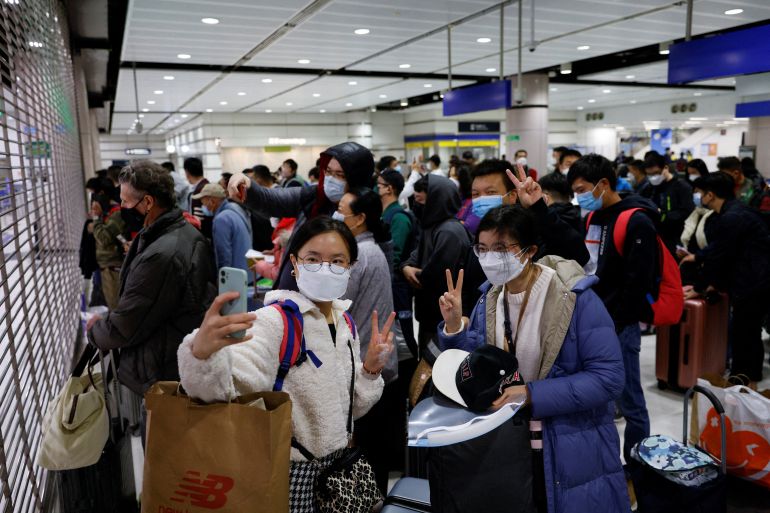
China has announced it will completely reopen its borders with the territories of Hong Kong and Macau, dropping COVID-19 testing requirements and daily quotas after nearly three years of closure.
The State Council’s Hong Kong and Macao Affairs Office said on Friday that all remaining restrictions would be dropped starting from midnight on February 6, with group tours allowed to restart.
Keep reading
Democracy ‘on trial’ as hong kong 47 prepare to face court democracy ‘on trial’ as hong kong 47 ..., making a point: hong kong journalists regroup abroad making a point: hong kong journalists ..., uk says hong kong freedoms continue to erode, drawing china anger uk says hong kong freedoms continue to ..., excitement as china opens borders to quarantine-free travel excitement as china opens borders to ....
Limited travel across the border between Hong Kong and mainland China resumed in January after Beijing abandoned the zero-COVID strategy that had split families, cut off tourism and suffocated businesses.
Hong Kong leader John Lee said on Friday that partial reopening had been “orderly, safe and smooth”.
Hong Kong has been largely sealed off for much of the past three years as its government sought to follow Beijing’s pandemic policies with mandatory quarantine of up to three weeks for arrivals, as well as intensive testing and screening.
The former British colony began to unwind some of its rules in the middle of 2022, and Lee announced that the territory would now scrap the longstanding requirement for all visitors to be vaccinated against COVID-19.
Searches on Chinese travel website Qunar for round-trip air tickets between Hong Kong and the mainland increased sevenfold on Friday after China’s announcement, data from state media China Transportation News showed.
People from the mainland have long made up the vast majority of visitors to Hong Kong, with about 51 million arrivals in 2018, nearly seven times the city’s population.
The prolonged pandemic restrictions are estimated to have cost the territory about $27bn and local officials are hoping an influx of visitors will revitalise the once-vibrant tourism and retail industries .
The full opening of the borders comes a day after Lee rolled out a rebranding campaign to woo overseas tourists, pledging more than half a million free flights and “no isolation, no quarantine and no restrictions”.
Outdoor masking remains compulsory in Hong Kong, although Lee has said the policy could be scrapped once cases of flu ease.
Macau Travel Restrictions
Traveler's COVID-19 vaccination status
Traveling from the United States to Macau
Open for vaccinated visitors
COVID-19 testing
Not required
Not required for vaccinated visitors
Restaurants
Not required in public spaces, enclosed environments and public transportation.
Ready to travel?
Find flights to macau, find stays in macau, explore more countries on travel restrictions map, destinations you can travel to now, dominican republic, netherlands, philippines, puerto rico, switzerland, united arab emirates, united kingdom, know when to go.
Sign up for email alerts as countries begin to open - choose the destinations you're interested in so you're in the know.
Can I travel to Macau from the United States?
Most visitors from the United States, regardless of vaccination status, can enter Macau.
Can I travel to Macau if I am vaccinated?
Fully vaccinated visitors from the United States can enter Macau without restrictions.
Can I travel to Macau without being vaccinated?
Unvaccinated visitors from the United States can enter Macau without restrictions.
Do I need a COVID test to enter Macau?
Visitors from the United States are not required to present a negative COVID-19 PCR test or antigen result upon entering Macau.
Can I travel to Macau without quarantine?
Travelers from the United States are not required to quarantine.
Do I need to wear a mask in Macau?
Mask usage in Macau is not required in public spaces, enclosed environments and public transportation.
Are the restaurants and bars open in Macau?
Restaurants in Macau are open. Bars in Macau are .
Moodie Davitt Report
Connect with us
Macau opens travel with Hong Kong despite COVID surge
CHINA. Cross-border transport companies are resuming service between the two Special Administrative Regions of Macau and Hong Kong after the Macau government relaxed its COVID-related entry restrictions from Friday 23 December.
The move came despite a surge in COVID-19 cases in Macau, linked to the lifting of previously stringent measures across Mainland China. In a surprise move, the Mainland authorities relaxed their previously rigid COVID-19 rules a fortnight ago with Macau subsequently following suit.
Travel retailers, restaurateurs and hoteliers have reported heavy infection rates among their staff. “75% of our staff are down,” one prominent Macau travel retailer told The Moodie Davitt Report today.
The Hong Kong-Macau Express bus service resumed on 24 December, connecting Hong Kong’s Prince Edward district to Grand Lisboa and MGM Cotai in Macau.
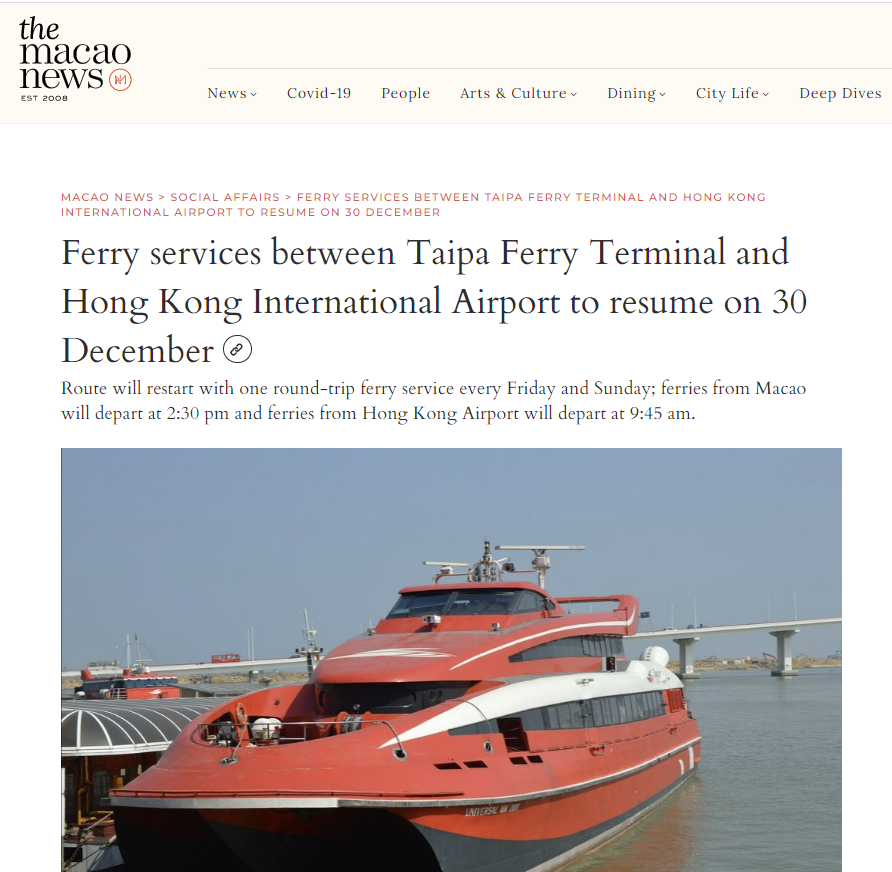
TurboJET ferry services between Macau’s Taipa Ferry Terminal and Hong Kong International Airport’s Skypier will resume on 30 December. The high-speed ferry service between downtown Hong Kong and Macau is also poised for a return. Ferry services between the two SARs, including the airport route, were suspended in February 2020 due to the pandemic.
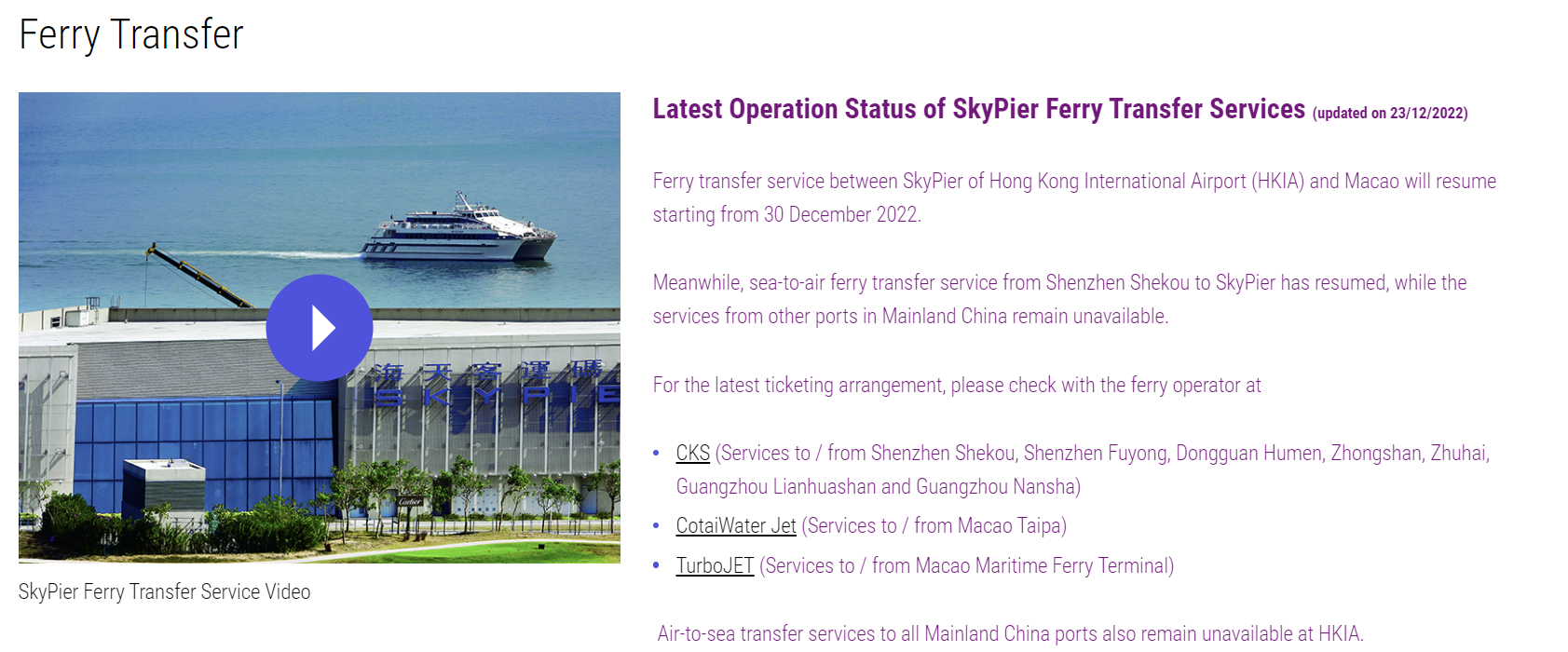
Bus service frequency on the Hong Kong-Zhuhai-Macau Bridge has also been increased.
The Macao News reported on Friday that some 115,000 people in the SAR had tested positive for the virus over the previous few days but experts in Macau believe the surge will peak during the next week.

In a report today, Macau Daily Times quoted Macau Chief Executive Ho Iat Seng saying there would be no backtracking on the decision to relax restrictions. The move was aimed at “opening up, so everyone could soon resume their normal life”, he told a media conference held at Macau International Airport on 24 December.
Travellers arriving from Hong Kong, Taiwan or foreign countries will no longer be tested upon arrival nor given a red health code. They will still need to have had a negative polymerase chain reaction (PCR) test within three days of entry, however.
After arrival, their health codes will turn yellow. Arriving visitors must still conduct rapid antigen tests (RAT) for five days after entry, after which their health code will turn green. Entry from Macau to Mainland China is not permitted until after midnight, nine days after arrival. ✈

Click on the image to read the bi-lingual launch issue of The Moodie Davitt China Travel Retail Report, our new quarterly eZine. The next edition will be published in January. Please email [email protected] for a complimentary first-year subscription. For editorial details please contact Martin Moodie at [email protected] . For advertising enquiries please email Irene Revilla at [email protected]
Follow us :
The Moodie Davitt Report Newsletter
Subscribe to our newsletter for critical marketing information delivered to your inbox
Related Articles

Shinsegae Duty Free’s recently launched characters, Paul & Bani, enter into their successive artistic collaboration, this time with renowned Korean singer-songwriter Naul.

Nestlé’s Swiss multinational bottled water division is also set to present its latest product innovations at the event including Maison Perrier, Essentia and Sanpellegrino Italian Sparkling Drinks Zero brands.

We feature highlights from this week’s Moodie Davitt Report WeChat Official Account, with our follower base climbing steadily to 5,422.
You are using an outdated browser. Upgrade your browser today or install Google Chrome Frame to better experience this site.
Macau SAR (China) Traveler View
Travel health notices, vaccines and medicines, non-vaccine-preventable diseases, stay healthy and safe.
- Packing List
After Your Trip

There are no notices currently in effect for Macau SAR (China).
⇧ Top
Check the vaccines and medicines list and visit your doctor at least a month before your trip to get vaccines or medicines you may need. If you or your doctor need help finding a location that provides certain vaccines or medicines, visit the Find a Clinic page.
Routine vaccines
Recommendations.
Make sure you are up-to-date on all routine vaccines before every trip. Some of these vaccines include
- Chickenpox (Varicella)
- Diphtheria-Tetanus-Pertussis
- Flu (influenza)
- Measles-Mumps-Rubella (MMR)
Immunization schedules
All eligible travelers should be up to date with their COVID-19 vaccines. Please see Your COVID-19 Vaccination for more information.
COVID-19 vaccine
Hepatitis A
Recommended for unvaccinated travelers one year old or older going to Macau.
Infants 6 to 11 months old should also be vaccinated against Hepatitis A. The dose does not count toward the routine 2-dose series.
Travelers allergic to a vaccine component or who are younger than 6 months should receive a single dose of immune globulin, which provides effective protection for up to 2 months depending on dosage given.
Unvaccinated travelers who are over 40 years old, immunocompromised, or have chronic medical conditions planning to depart to a risk area in less than 2 weeks should get the initial dose of vaccine and at the same appointment receive immune globulin.
Hepatitis A - CDC Yellow Book
Dosing info - Hep A
Hepatitis B
Recommended for unvaccinated travelers of all ages traveling to Macau.
Hepatitis B - CDC Yellow Book
Dosing info - Hep B
Cases of measles are on the rise worldwide. Travelers are at risk of measles if they have not been fully vaccinated at least two weeks prior to departure, or have not had measles in the past, and travel internationally to areas where measles is spreading.
All international travelers should be fully vaccinated against measles with the measles-mumps-rubella (MMR) vaccine, including an early dose for infants 6–11 months, according to CDC’s measles vaccination recommendations for international travel .
Measles (Rubeola) - CDC Yellow Book
Dogs infected with rabies are not commonly found in Macau.
If rabies exposures occur while in Macau, rabies vaccines are typically available throughout most of the country.
Rabies pre-exposure vaccination considerations include whether travelers 1) will be performing occupational or recreational activities that increase risk for exposure to potentially rabid animals and 2) might have difficulty getting prompt access to safe post-exposure prophylaxis.
Please consult with a healthcare provider to determine whether you should receive pre-exposure vaccination before travel.
For more information, see country rabies status assessments .
Rabies - CDC Yellow Book
Recommended for most travelers, especially those staying with friends or relatives or visiting smaller cities or rural areas.
Typhoid - CDC Yellow Book
Dosing info - Typhoid
Avoid contaminated water
Leptospirosis
How most people get sick (most common modes of transmission)
- Touching urine or other body fluids from an animal infected with leptospirosis
- Swimming or wading in urine-contaminated fresh water, or contact with urine-contaminated mud
- Drinking water or eating food contaminated with animal urine
- Avoid contaminated water and soil
Clinical Guidance
Avoid bug bites.
Chikungunya
- Mosquito bite
- Avoid Bug Bites
- Mosquito bite
Airborne & droplet
- Breathing in air or accidentally eating food contaminated with the urine, droppings, or saliva of infected rodents
- Bite from an infected rodent
- Less commonly, being around someone sick with hantavirus (only occurs with Andes virus)
- Avoid rodents and areas where they live
- Avoid sick people
Tuberculosis (TB)
- Breathe in TB bacteria that is in the air from an infected and contagious person coughing, speaking, or singing.
Learn actions you can take to stay healthy and safe on your trip. Vaccines cannot protect you from many diseases in Macau, so your behaviors are important.
Eat and drink safely
Food and water standards around the world vary based on the destination. Standards may also differ within a country and risk may change depending on activity type (e.g., hiking versus business trip). You can learn more about safe food and drink choices when traveling by accessing the resources below.
- Choose Safe Food and Drinks When Traveling
- Water Treatment Options When Hiking, Camping or Traveling
- Global Water, Sanitation and Hygiene | Healthy Water
- Avoid Contaminated Water During Travel
You can also visit the Department of State Country Information Pages for additional information about food and water safety.
Prevent bug bites
Bugs (like mosquitoes, ticks, and fleas) can spread a number of diseases in Macau. Many of these diseases cannot be prevented with a vaccine or medicine. You can reduce your risk by taking steps to prevent bug bites.
What can I do to prevent bug bites?
- Cover exposed skin by wearing long-sleeved shirts, long pants, and hats.
- Use an appropriate insect repellent (see below).
- Use permethrin-treated clothing and gear (such as boots, pants, socks, and tents). Do not use permethrin directly on skin.
- Stay and sleep in air-conditioned or screened rooms.
- Use a bed net if the area where you are sleeping is exposed to the outdoors.
What type of insect repellent should I use?
- FOR PROTECTION AGAINST TICKS AND MOSQUITOES: Use a repellent that contains 20% or more DEET for protection that lasts up to several hours.
- Picaridin (also known as KBR 3023, Bayrepel, and icaridin)
- Oil of lemon eucalyptus (OLE) or para-menthane-diol (PMD)
- 2-undecanone
- Always use insect repellent as directed.
What should I do if I am bitten by bugs?
- Avoid scratching bug bites, and apply hydrocortisone cream or calamine lotion to reduce the itching.
- Check your entire body for ticks after outdoor activity. Be sure to remove ticks properly.
What can I do to avoid bed bugs?
Although bed bugs do not carry disease, they are an annoyance. See our information page about avoiding bug bites for some easy tips to avoid them. For more information on bed bugs, see Bed Bugs .
For more detailed information on avoiding bug bites, see Avoid Bug Bites .
Stay safe outdoors
If your travel plans in Macau include outdoor activities, take these steps to stay safe and healthy during your trip.
- Stay alert to changing weather conditions and adjust your plans if conditions become unsafe.
- Prepare for activities by wearing the right clothes and packing protective items, such as bug spray, sunscreen, and a basic first aid kit.
- Consider learning basic first aid and CPR before travel. Bring a travel health kit with items appropriate for your activities.
- If you are outside for many hours in heat, eat salty snacks and drink water to stay hydrated and replace salt lost through sweating.
- Protect yourself from UV radiation : use sunscreen with an SPF of at least 15, wear protective clothing, and seek shade during the hottest time of day (10 a.m.–4 p.m.).
- Be especially careful during summer months and at high elevation. Because sunlight reflects off snow, sand, and water, sun exposure may be increased during activities like skiing, swimming, and sailing.
- Very cold temperatures can be dangerous. Dress in layers and cover heads, hands, and feet properly if you are visiting a cold location.
Stay safe around water
- Swim only in designated swimming areas. Obey lifeguards and warning flags on beaches.
- Practice safe boating—follow all boating safety laws, do not drink alcohol if driving a boat, and always wear a life jacket.
- Do not dive into shallow water.
- Do not swim in freshwater in developing areas or where sanitation is poor.
- Avoid swallowing water when swimming. Untreated water can carry germs that make you sick.
- To prevent infections, wear shoes on beaches where there may be animal waste.
Keep away from animals
Most animals avoid people, but they may attack if they feel threatened, are protecting their young or territory, or if they are injured or ill. Animal bites and scratches can lead to serious diseases such as rabies.
Follow these tips to protect yourself:
- Do not touch or feed any animals you do not know.
- Do not allow animals to lick open wounds, and do not get animal saliva in your eyes or mouth.
- Avoid rodents and their urine and feces.
- Traveling pets should be supervised closely and not allowed to come in contact with local animals.
- If you wake in a room with a bat, seek medical care immediately. Bat bites may be hard to see.
All animals can pose a threat, but be extra careful around dogs, bats, monkeys, sea animals such as jellyfish, and snakes. If you are bitten or scratched by an animal, immediately:
- Wash the wound with soap and clean water.
- Go to a doctor right away.
- Tell your doctor about your injury when you get back to the United States.
Consider buying medical evacuation insurance. Rabies is a deadly disease that must be treated quickly, and treatment may not be available in some countries.
Reduce your exposure to germs
Follow these tips to avoid getting sick or spreading illness to others while traveling:
- Wash your hands often, especially before eating.
- If soap and water aren’t available, clean hands with hand sanitizer (containing at least 60% alcohol).
- Don’t touch your eyes, nose, or mouth. If you need to touch your face, make sure your hands are clean.
- Cover your mouth and nose with a tissue or your sleeve (not your hands) when coughing or sneezing.
- Try to avoid contact with people who are sick.
- If you are sick, stay home or in your hotel room, unless you need medical care.
Avoid sharing body fluids
Diseases can be spread through body fluids, such as saliva, blood, vomit, and semen.
Protect yourself:
- Use latex condoms correctly.
- Do not inject drugs.
- Limit alcohol consumption. People take more risks when intoxicated.
- Do not share needles or any devices that can break the skin. That includes needles for tattoos, piercings, and acupuncture.
- If you receive medical or dental care, make sure the equipment is disinfected or sanitized.
Know how to get medical care while traveling
Plan for how you will get health care during your trip, should the need arise:
- Carry a list of local doctors and hospitals at your destination.
- Review your health insurance plan to determine what medical services it would cover during your trip. Consider purchasing travel health and medical evacuation insurance.
- Carry a card that identifies, in the local language, your blood type, chronic conditions or serious allergies, and the generic names of any medications you take.
- Some prescription drugs may be illegal in other countries. Call Macau’s embassy to verify that all of your prescription(s) are legal to bring with you.
- Bring all the medicines (including over-the-counter medicines) you think you might need during your trip, including extra in case of travel delays. Ask your doctor to help you get prescriptions filled early if you need to.
Many foreign hospitals and clinics are accredited by the Joint Commission International. A list of accredited facilities is available at their website ( www.jointcommissioninternational.org ).
In some countries, medicine (prescription and over-the-counter) may be substandard or counterfeit. Bring the medicines you will need from the United States to avoid having to buy them at your destination.
Select safe transportation
Motor vehicle crashes are the #1 killer of healthy US citizens in foreign countries.
In many places cars, buses, large trucks, rickshaws, bikes, people on foot, and even animals share the same lanes of traffic, increasing the risk for crashes.
Be smart when you are traveling on foot.
- Use sidewalks and marked crosswalks.
- Pay attention to the traffic around you, especially in crowded areas.
- Remember, people on foot do not always have the right of way in other countries.
Riding/Driving
Choose a safe vehicle.
- Choose official taxis or public transportation, such as trains and buses.
- Ride only in cars that have seatbelts.
- Avoid overcrowded, overloaded, top-heavy buses and minivans.
- Avoid riding on motorcycles or motorbikes, especially motorbike taxis. (Many crashes are caused by inexperienced motorbike drivers.)
- Choose newer vehicles—they may have more safety features, such as airbags, and be more reliable.
- Choose larger vehicles, which may provide more protection in crashes.
Think about the driver.
- Do not drive after drinking alcohol or ride with someone who has been drinking.
- Consider hiring a licensed, trained driver familiar with the area.
- Arrange payment before departing.
Follow basic safety tips.
- Wear a seatbelt at all times.
- Sit in the back seat of cars and taxis.
- When on motorbikes or bicycles, always wear a helmet. (Bring a helmet from home, if needed.)
- Avoid driving at night; street lighting in certain parts of Macau may be poor.
- Do not use a cell phone or text while driving (illegal in many countries).
- Travel during daylight hours only, especially in rural areas.
- If you choose to drive a vehicle in Macau, learn the local traffic laws and have the proper paperwork.
- Get any driving permits and insurance you may need. Get an International Driving Permit (IDP). Carry the IDP and a US-issued driver's license at all times.
- Check with your auto insurance policy's international coverage, and get more coverage if needed. Make sure you have liability insurance.
- Avoid using local, unscheduled aircraft.
- If possible, fly on larger planes (more than 30 seats); larger airplanes are more likely to have regular safety inspections.
- Try to schedule flights during daylight hours and in good weather.
Medical Evacuation Insurance
If you are seriously injured, emergency care may not be available or may not meet US standards. Trauma care centers are uncommon outside urban areas. Having medical evacuation insurance can be helpful for these reasons.
Helpful Resources
Road Safety Overseas (Information from the US Department of State): Includes tips on driving in other countries, International Driving Permits, auto insurance, and other resources.
The Association for International Road Travel has country-specific Road Travel Reports available for most countries for a minimal fee.
Traffic flows on the left side of the road in Macau.
- Always pay close attention to the flow of traffic, especially when crossing the street.
- LOOK RIGHT for approaching traffic.
Maintain personal security
Use the same common sense traveling overseas that you would at home, and always stay alert and aware of your surroundings.
Before you leave
- Research your destination(s), including local laws, customs, and culture.
- Monitor travel advisories and alerts and read travel tips from the US Department of State.
- Enroll in the Smart Traveler Enrollment Program (STEP) .
- Leave a copy of your itinerary, contact information, credit cards, and passport with someone at home.
- Pack as light as possible, and leave at home any item you could not replace.
While at your destination(s)
- Carry contact information for the nearest US embassy or consulate .
- Carry a photocopy of your passport and entry stamp; leave the actual passport securely in your hotel.
- Follow all local laws and social customs.
- Do not wear expensive clothing or jewelry.
- Always keep hotel doors locked, and store valuables in secure areas.
- If possible, choose hotel rooms between the 2nd and 6th floors.
Healthy Travel Packing List
Use the Healthy Travel Packing List for Macau SAR (China) for a list of health-related items to consider packing for your trip. Talk to your doctor about which items are most important for you.
Why does CDC recommend packing these health-related items?
It’s best to be prepared to prevent and treat common illnesses and injuries. Some supplies and medicines may be difficult to find at your destination, may have different names, or may have different ingredients than what you normally use.
If you are not feeling well after your trip, you may need to see a doctor. If you need help finding a travel medicine specialist, see Find a Clinic . Be sure to tell your doctor about your travel, including where you went and what you did on your trip. Also tell your doctor if you were bitten or scratched by an animal while traveling.
For more information on what to do if you are sick after your trip, see Getting Sick after Travel .
Map Disclaimer - The boundaries and names shown and the designations used on maps do not imply the expression of any opinion whatsoever on the part of the Centers for Disease Control and Prevention concerning the legal status of any country, territory, city or area or of its authorities, or concerning the delimitation of its frontiers or boundaries. Approximate border lines for which there may not yet be full agreement are generally marked.
Other Destinations
If you need help finding travel information:
Message & data rates may apply. CDC Privacy Policy
File Formats Help:
- Adobe PDF file
- Microsoft PowerPoint file
- Microsoft Word file
- Microsoft Excel file
- Audio/Video file
- Apple Quicktime file
- RealPlayer file
- Zip Archive file
Exit Notification / Disclaimer Policy
- The Centers for Disease Control and Prevention (CDC) cannot attest to the accuracy of a non-federal website.
- Linking to a non-federal website does not constitute an endorsement by CDC or any of its employees of the sponsors or the information and products presented on the website.
- You will be subject to the destination website's privacy policy when you follow the link.
- CDC is not responsible for Section 508 compliance (accessibility) on other federal or private website.
- Skip to main content
- Skip to "About this site"
Language selection
Search travel.gc.ca.
Help us to improve our website. Take our survey !
COVID-19: travel health notice for all travellers
Macao travel advice
Latest updates: The Health section was updated - travel health information (Public Health Agency of Canada)
Last updated: May 6, 2024 10:24 ET
On this page
Safety and security, entry and exit requirements, laws and culture, natural disasters and climate, macao - exercise a high degree of caution.
Exercise a high degree of caution in Macao due to the risk of arbitrary enforcement of local laws.
Back to top
Petty crime such as pickpocketing and purse snatching occurs, particularly:
- at the airport
- on public transportation
- in main shopping areas and markets
- in hotel lobbies
- on crowded streets
- at tourist attractions
While in Macao:
- be vigilant in crowded locations
- don’t carry large sums of money
- ensure that your belongings, including your passport and other travel documents, are secure at all times
Credit card and ATM fraud occurs. When using debit or credit cards:
- pay careful attention when others are handling your cards
- use ATMs located inside a bank or business
- avoid using card readers with an irregular or unusual feature
- cover the keypad with one hand when entering your PIN
- check for any unauthorized transactions on your account statements
Overseas fraud
Demonstrations
Demonstrations are illegal without prior approval from the local government.
Even peaceful demonstrations can turn violent at any time. They can also lead to disruptions to traffic and public transportation.
If you participate in or are witness to a demonstration, you may be subject to scrutiny and severe legal action.
- Avoid areas where demonstrations and large gatherings are taking place
- Don’t film or take pictures of demonstrations
- Follow the instructions of local authorities
- Monitor local media for information on ongoing demonstrations
Mass gatherings (large-scale events)
Cyber security
You shouldn’t expect internet privacy. Your communications may be monitored at any time, and authorities may review the content stored or consulted on your electronic devices.
Authorities will be on the lookout for material appearing to be seditious or that is critical of mainland China and local authorities
Cyber security while travelling
Journalism and research
Journalists and other media workers in Macao are facing certain restrictions in the context of their work.
You should be particularly vigilant if researching or reporting on subjects critical of or sensitive to the government. You may face censorship.
Road safety
Roads are narrow and winding. Traffic is usually congested.
Public transportation
Public transportation is safe and reliable but may be limited outside tourist areas. Certain casinos and leisure establishments operate shuttles.
Taxis are widely available. Certain ride-sharing apps are illegal in Macao.
Most taxi drivers don’t speak English or French. If you don’t speak Chinese, you should arrange for a person to write out your destination in Chinese characters before you go.
- Use only officially marked taxis
- Negotiate fares in advance, or insist that the driver use the meter, as you may be overcharged
We do not make assessments on the compliance of foreign domestic airlines with international safety standards.
Information about foreign domestic airlines
Macao is a special administrative region (SAR) of the People’s Republic of China.
Every country or territory decides who can enter or exit through its borders. The Government of Canada cannot intervene on your behalf if you do not meet your destination’s entry or exit requirements.
We have obtained the information on this page from the Chinese authorities. It can, however, change at any time.
Verify this information with the Foreign Representatives in Canada .
Entry requirements vary depending on the type of passport you use for travel.
Before you travel, check with your transportation company about passport requirements. Its rules on passport validity may be more stringent than the country’s entry rules.
Regular Canadian passport
Your passport must be valid for at least 30 days beyond the date of expected departure from Macao.
Passport for official travel
Different entry rules may apply.
Official travel
Passport with “X” gender identifier
While the Government of Canada issues passports with an “X” gender identifier, it cannot guarantee your entry or transit through other countries. You might face entry restrictions in countries that do not recognize the “X” gender identifier. Before you leave, check with the closest foreign representative for your destination.
Other travel documents
Different entry rules may apply when travelling with a temporary passport or an emergency travel document. Before you leave, check with the closest foreign representative for your destination.
Useful links
- Foreign Representatives in Canada
- Canadian passports
Tourist visa: not required for stays of up to 30 days Business visa: not required Investment visa: required Student visa: required
As a tourist, if you wish to stay in Macao longer than 30 days, you must apply for an extension of stay at the Immigration Department of the Macao SAR.
If you plan to visit or transit through mainland China, make sure you obtain a Chinese visa before your trip.
If you plan to travel between Macao, Hong Kong and mainland China make sure you apply for a visa allowing multiple entries.
- Entry and Exit of Non-residents - Public Security Police Force of Macao
- Entry/exit requirements for mainland China
Other entry requirements
You must have an onward or return ticket and proof of sufficient funds to visit Macao, unless you can show proof of residency in China or Hong Kong.
Children and travel
Learn more about travelling with children .
Yellow fever
Learn about potential entry requirements related to yellow fever (vaccines section).
Relevant Travel Health Notices
- Global Measles Notice - 13 March, 2024
- COVID-19 and International Travel - 13 March, 2024
This section contains information on possible health risks and restrictions regularly found or ongoing in the destination. Follow this advice to lower your risk of becoming ill while travelling. Not all risks are listed below.
Consult a health care professional or visit a travel health clinic preferably 6 weeks before you travel to get personalized health advice and recommendations.
Routine vaccines
Be sure that your routine vaccinations , as per your province or territory , are up-to-date before travelling, regardless of your destination.
Some of these vaccinations include measles-mumps-rubella (MMR), diphtheria, tetanus, pertussis, polio, varicella (chickenpox), influenza and others.
Pre-travel vaccines and medications
You may be at risk for preventable diseases while travelling in this destination. Talk to a travel health professional about which medications or vaccines may be right for you, based on your destination and itinerary.
Yellow fever is a disease caused by a flavivirus from the bite of an infected mosquito.
Travellers get vaccinated either because it is required to enter a country or because it is recommended for their protection.
- There is no risk of yellow fever in this country.
Country Entry Requirement*
- Proof of vaccination is not required to enter this country.
Recommendation
- Vaccination is not recommended.
* It is important to note that country entry requirements may not reflect your risk of yellow fever at your destination. It is recommended that you contact the nearest diplomatic or consular office of the destination(s) you will be visiting to verify any additional entry requirements.
About Yellow Fever
Yellow Fever Vaccination Centres in Canada
There is a risk of hepatitis A in this destination. It is a disease of the liver. People can get hepatitis A if they ingest contaminated food or water, eat foods prepared by an infectious person, or if they have close physical contact (such as oral-anal sex) with an infectious person, although casual contact among people does not spread the virus.
Practise safe food and water precautions and wash your hands often. Vaccination is recommended for all travellers to areas where hepatitis A is present.
Measles is a highly contagious viral disease. It can spread quickly from person to person by direct contact and through droplets in the air.
Anyone who is not protected against measles is at risk of being infected with it when travelling internationally.
Regardless of where you are going, talk to a health care professional before travelling to make sure you are fully protected against measles.
Japanese encephalitis is a viral infection that can cause swelling of the brain. It is spread to humans through the bite of an infected mosquito. Risk is very low for most travellers. Travellers at relatively higher risk may want to consider vaccination for JE prior to travelling.
Travellers are at higher risk if they will be:
- travelling long term (e.g. more than 30 days)
- making multiple trips to endemic areas
- staying for extended periods in rural areas
- visiting an area suffering a JE outbreak
- engaging in activities involving high contact with mosquitos (e.g., entomologists)
Hepatitis B is a risk in every destination. It is a viral liver disease that is easily transmitted from one person to another through exposure to blood and body fluids containing the hepatitis B virus. Travellers who may be exposed to blood or other bodily fluids (e.g., through sexual contact, medical treatment, sharing needles, tattooing, acupuncture or occupational exposure) are at higher risk of getting hepatitis B.
Hepatitis B vaccination is recommended for all travellers. Prevent hepatitis B infection by practicing safe sex, only using new and sterile drug equipment, and only getting tattoos and piercings in settings that follow public health regulations and standards.
Coronavirus disease (COVID-19) is an infectious viral disease. It can spread from person to person by direct contact and through droplets in the air.
It is recommended that all eligible travellers complete a COVID-19 vaccine series along with any additional recommended doses in Canada before travelling. Evidence shows that vaccines are very effective at preventing severe illness, hospitalization and death from COVID-19. While vaccination provides better protection against serious illness, you may still be at risk of infection from the virus that causes COVID-19. Anyone who has not completed a vaccine series is at increased risk of being infected with the virus that causes COVID-19 and is at greater risk for severe disease when travelling internationally.
Before travelling, verify your destination’s COVID-19 vaccination entry/exit requirements. Regardless of where you are going, talk to a health care professional before travelling to make sure you are adequately protected against COVID-19.
The best way to protect yourself from seasonal influenza (flu) is to get vaccinated every year. Get the flu shot at least 2 weeks before travelling.
The flu occurs worldwide.
- In the Northern Hemisphere, the flu season usually runs from November to April.
- In the Southern Hemisphere, the flu season usually runs between April and October.
- In the tropics, there is flu activity year round.
The flu vaccine available in one hemisphere may only offer partial protection against the flu in the other hemisphere.
The flu virus spreads from person to person when they cough or sneeze or by touching objects and surfaces that have been contaminated with the virus. Clean your hands often and wear a mask if you have a fever or respiratory symptoms.
In this destination, rabies may be present in some wildlife species, including bats. Rabies is a deadly disease that spreads to humans primarily through bites or scratches from an infected animal.
If you are bitten or scratched by an animal while travelling, immediately wash the wound with soap and clean water and see a health care professional.
Before travel, discuss rabies vaccination with a health care professional. It may be recommended for travellers who will be working directly with wildlife.
Safe food and water precautions
Many illnesses can be caused by eating food or drinking beverages contaminated by bacteria, parasites, toxins, or viruses, or by swimming or bathing in contaminated water.
- Learn more about food and water precautions to take to avoid getting sick by visiting our eat and drink safely abroad page. Remember: Boil it, cook it, peel it, or leave it!
- Avoid getting water into your eyes, mouth or nose when swimming or participating in activities in freshwater (streams, canals, lakes), particularly after flooding or heavy rain. Water may look clean but could still be polluted or contaminated.
- Avoid inhaling or swallowing water while bathing, showering, or swimming in pools or hot tubs.
Typhoid is a bacterial infection spread by contaminated food or water. Risk is higher among children, travellers going to rural areas, travellers visiting friends and relatives or those travelling for a long period of time.
Travellers visiting regions with a risk of typhoid, especially those exposed to places with poor sanitation, should speak to a health care professional about vaccination.
Insect bite prevention
Many diseases are spread by the bites of infected insects such as mosquitoes, ticks, fleas or flies. When travelling to areas where infected insects may be present:
- Use insect repellent (bug spray) on exposed skin
- Cover up with light-coloured, loose clothes made of tightly woven materials such as nylon or polyester
- Minimize exposure to insects
- Use mosquito netting when sleeping outdoors or in buildings that are not fully enclosed
To learn more about how you can reduce your risk of infection and disease caused by bites, both at home and abroad, visit our insect bite prevention page.
Find out what types of insects are present where you’re travelling, when they’re most active, and the symptoms of the diseases they spread.
There is a risk of chikungunya in this country. The risk may vary between regions of a country. Chikungunya is a virus spread through the bite of an infected mosquito. Chikungunya can cause a viral disease that typically causes fever and pain in the joints. In some cases, the joint pain can be severe and last for months or years.
Protect yourself from mosquito bites at all times. There is no vaccine available for chikungunya.
Crimean-Congo haemorrhagic fever is a viral disease that can cause fever, pain and bleeding under the skin. In some cases, it can be fatal. It spreads to humans through contact with infected animal blood or tissues, or from the bite of an infected tick. Risk is generally low for most travellers. Protect yourself from tick bites and avoid animals, particularly livestock. There is no vaccine available for Crimean-Congo haemorrhagic fever.
- In this country, risk of dengue is sporadic. It is a viral disease spread to humans by mosquito bites.
- Dengue can cause flu-like symptoms. In some cases, it can lead to severe dengue, which can be fatal.
- The level of risk of dengue changes seasonally, and varies from year to year. The level of risk also varies between regions in a country and can depend on the elevation in the region.
- Mosquitoes carrying dengue typically bite during the daytime, particularly around sunrise and sunset.
- Protect yourself from mosquito bites . There is no vaccine or medication that protects against dengue fever.
Animal precautions
Some infections, such as rabies and influenza, can be shared between humans and animals. Certain types of activities may increase your chance of contact with animals, such as travelling in rural or forested areas, camping, hiking, and visiting wet markets (places where live animals are slaughtered and sold) or caves.
Travellers are cautioned to avoid contact with animals, including dogs, livestock (pigs, cows), monkeys, snakes, rodents, birds, and bats, and to avoid eating undercooked wild game.
Closely supervise children, as they are more likely to come in contact with animals.
Person-to-person infections
Stay home if you’re sick and practise proper cough and sneeze etiquette , which includes coughing or sneezing into a tissue or the bend of your arm, not your hand. Reduce your risk of colds, the flu and other illnesses by:
- washing your hands often
- avoiding or limiting the amount of time spent in closed spaces, crowded places, or at large-scale events (concerts, sporting events, rallies)
- avoiding close physical contact with people who may be showing symptoms of illness
Sexually transmitted infections (STIs) , HIV , and mpox are spread through blood and bodily fluids; use condoms, practise safe sex, and limit your number of sexual partners. Check with your local public health authority pre-travel to determine your eligibility for mpox vaccine.
Tuberculosis is an infection caused by bacteria and usually affects the lungs.
For most travellers the risk of tuberculosis is low.
Travellers who may be at high risk while travelling in regions with risk of tuberculosis should discuss pre- and post-travel options with a health care professional.
High-risk travellers include those visiting or working in prisons, refugee camps, homeless shelters, or hospitals, or travellers visiting friends and relatives.
Medical services and facilities
Good medical care is available in major hospitals. Payment up front is often expected.
Make sure you get travel insurance that includes coverage for medical evacuation and hospital stays.
Travel health and safety
Keep in Mind...
The decision to travel is the sole responsibility of the traveller. The traveller is also responsible for his or her own personal safety.
Be prepared. Do not expect medical services to be the same as in Canada. Pack a travel health kit , especially if you will be travelling away from major city centres.
You must abide by local laws.
Learn about what you should do and how we can help if you are arrested or detained abroad .
National security law
The National security law for Macao came into effect in 2009. Activities considered as national security violations are broadly and vaguely defined. They could include activities that are not considered illegal in Canada and that occurred outside of Macao.
In May 2023, local authorities' power to enforce laws outside of Macao was expanded but the details of its implementation remain vague.
You risk being arbitrarily detained on national security grounds, even while you are transiting through Macao. You could be subject to transfer to mainland China for prosecution. Penalties are severe and include long prison sentences.
Bans and sanctions
The Chinese government may ban or sanction entities or individuals for actions, including oral or written statements, and associations with entities that are critical of:
- the Communist Party of China
- the Chinese government
- Chinese leaders and policies
The Government of the People’s Republic of China does not publicize a list of banned or sanctioned entities or individuals, and the implementation of bans or sanctions remains vague. The effect on individuals associated with banned or sanctioned entities is unknown.
It could include:
- a ban on travel to mainland China, Hong Kong and Macao
- freezing of assets
- prohibition of business or association with Chinese citizens and organizations
If you believe you may be subject of a ban or sanctions, consult a lawyer and contact the closest office of the Government of Canada.
Penalties for possession, use or trafficking of illegal drugs are severe. Convicted offenders can expect jail sentences and heavy fines.
Drugs, alcohol and travel
Photography
Photography of military installations, government buildings may be restricted. Seek permission from local authorities before taking photographs.
Taking photographs in the gambling areas of the casinos is prohibited.
Dual citizenship
The Nationality Law of the People's Republic of China applies in the Macao Special Administrative Region (MSAR). Under this law, dual citizenship is not legally recognized in Macao.
If local authorities consider you a citizen of China, they may refuse to grant you access to Canadian consular services. This will prevent us from providing you with those services.
If you are a Canadian dual citizen born in Macao or with current or previous Macao residency, you need to complete a declaration of nationality in order to be treated as a Canadian citizen. Consult the Macao Department of Identification regarding this process.
- More information about naturalization - Macao Department of Identification
- General information for travellers with dual citizenship
International Child Abduction
The Hague Convention on the Civil Aspects of International Child Abduction is an international treaty. It can help parents with the return of children who have been removed to or retained in certain countries in violation of custody rights. The convention applies between Canada and Macao.
If your child was wrongfully taken to, or is being held in Macao, and if the applicable conditions are met, you may apply for the return of your child to the Macao court.
If you are in this situation:
- act as quickly as you can
- contact the Central Authority for your province or territory of residence for information on starting an application under The Hague Convention
- consult a lawyer in Canada and in Macao to explore all the legal options for the return of your child
- report the situation to the nearest Canadian government office abroad or to the Vulnerable Children’s Consular Unit at Global Affairs Canada by calling the Emergency Watch and Response Centre
If your child was removed from a country other than Canada, consult a lawyer to determine if The Hague Convention applies.
Be aware that Canadian consular officials cannot interfere in private legal matters or in another country’s judicial affairs.
- List of Canadian Central Authorities for the Hague Convention
- International Child Abduction: A Guidebook for Left-Behind Parents
- Travelling with children
- The Hague Convention - Hague Conference on Private International Law
- Canadian embassies and consulates by destination
- Emergency Watch and Response Centre
Traffic drives on the left.
You should carry an international driving permit. If you are a resident of Macao, you can exchange your Canadian licence for a local one under certain conditions.
- Foreign licence exchange - Government of Macao
- More about the International Driving Permit
The currency is the Macao pataca (MOP). Hong Kong dollars are also accepted.
Upon entering or leaving Macao, you must make a declaration to customs if you travel with more than MOP 120,000 or the equivalent in other currencies. The sum can be in cash, cheques, money orders, traveller’s cheques or any other convertible assets.
Typhoons and monsoon
The rainy (or monsoon) season extends from May to October. Typhoons usually occur between April and October.
During this period, even small storm can quickly develop into typhoons. These severe storms can put you at risk and hamper the provision of essential services.
Severe rainstorms have occasionally caused flooding and landslides, resulting in loss of life and damage to infrastructure.
The Macao observatory issues alerts before a significant storm or other meteorological risk.
If you decide to travel to Macao during the rainy season:
- know that you may expose yourself to safety risks
- be prepared to change your travel plans on short notice, including cutting short or cancelling your trip
- stay informed of the latest regional weather forecasts
- carry emergency contact information for your airline or tour operator
- follow the advice and instructions of local authorities
- Current weather and alerts - Macao Meteorological and Geophysical Bureau
- Tornadoes, cyclones, hurricanes, typhoons and monsoons
- Large-scale emergencies abroad
Heat and humidity
Humidity and heat are most severe during the hot season, from May to October.
Know the symptoms of dehydration and heatstroke, both of which can be fatal.
Air pollution
Air pollution can be severe in Macao.
During periods of high pollution:
- limit outdoor activities
- monitor local media and air pollution levels
- follow the instructions of local authorities
Air pollution in Macao - World Air Quality Index
Local services
Dial 112 for emergency assistance.
Consular assistance
For emergency consular assistance, call the Consulate General of Canada in Hong Kong and follow the instructions. At any time, you may also contact the Emergency Watch and Response Centre in Ottawa.
The decision to travel is your choice and you are responsible for your personal safety abroad. We take the safety and security of Canadians abroad very seriously and provide credible and timely information in our Travel Advice to enable you to make well-informed decisions regarding your travel abroad.
The content on this page is provided for information only. While we make every effort to give you correct information, it is provided on an "as is" basis without warranty of any kind, expressed or implied. The Government of Canada does not assume responsibility and will not be liable for any damages in connection to the information provided.
If you need consular assistance while abroad, we will make every effort to help you. However, there may be constraints that will limit the ability of the Government of Canada to provide services.
Learn more about consular services .

Risk Levels
take normal security precautions.
Take similar precautions to those you would take in Canada.
Exercise a high degree of caution
There are certain safety and security concerns or the situation could change quickly. Be very cautious at all times, monitor local media and follow the instructions of local authorities.
IMPORTANT: The two levels below are official Government of Canada Travel Advisories and are issued when the safety and security of Canadians travelling or living in the country or region may be at risk.
Avoid non-essential travel
Your safety and security could be at risk. You should think about your need to travel to this country, territory or region based on family or business requirements, knowledge of or familiarity with the region, and other factors. If you are already there, think about whether you really need to be there. If you do not need to be there, you should think about leaving.
Avoid all travel
You should not travel to this country, territory or region. Your personal safety and security are at great risk. If you are already there, you should think about leaving if it is safe to do so.
Security Alert May 17, 2024
Worldwide caution, update may 10, 2024, information for u.s. citizens in the middle east.
- Travel Advisories |
- Contact Us |
- MyTravelGov |
Find U.S. Embassies & Consulates
Travel.state.gov, congressional liaison, special issuance agency, u.s. passports, international travel, intercountry adoption, international parental child abduction, records and authentications, popular links, travel advisories, mytravelgov, stay connected, legal resources, legal information, info for u.s. law enforcement, replace or certify documents.
Before You Go
Learn About Your Destination
While Abroad
Emergencies
Share this page:
Travel Advisory April 12, 2024
Mainland china, hong kong & macau - see summaries.
Updated due to new national security legislation in the Hong Kong Special Administrative Region.
Summary: Reconsider travel to Mainland China due to the arbitrary enforcement of local laws, including in relation to exit bans, and the risk of wrongful detentions.
Exercise increased caution when traveling to the Hong Kong Special Administrative Region (SAR) due to the arbitrary enforcement of local laws .
Reconsider travel to the Macau Special Administrative Region (SAR) due to a limited ability to provide emergency consular services . Exercise increased caution when traveling to the Macau SAR due to the arbitrary enforcement of local laws .
See specific risks and conditions in each jurisdiction .
Consulate Messages
View Alerts and Messages Archive
Quick Facts
One month beyond the date of your intended stay
One page required for entry stamp
Not required for stays under 90 days
Embassies and Consulates
U.S. Consulate General Hong Kong & Macau 26 Garden Road Central, Hong Kong Telephone: +852 2841-2211, +852 2841-2225, +852 2841-2323 Emergency After-Hours Telephone: +852 2523-9011 Fax: +852 2845-4845 Email: [email protected]
Destination Description
See the U.S. Department of State’s Fact Sheet on Hong Kong for information on U.S.-Hong Kong relations.
Entry, Exit and Visa Requirements
Visit the Hong Kong Immigration Department website for the most current visa information.
Find information on dual nationality , prevention of international child abduction , and customs regulations on our website.
To enter the Hong Kong Special Administrative Region (SAR), you need:
- a passport that is valid for at least one month beyond the date of your intended stay;
- adequate funds to cover your stay without working locally; and
- evidence of onward/return transportation.
You only need a visa if:
- You plan to stay for more than 90 days – obtain an extension with the Hong Kong SAR Immigration Department, if necessary.
- You plan to work or study in the Hong Kong SAR – visas must be obtained prior to departing the United States.
You must possess a valid passport and PRC visa to enter the People’s Republic of China (PRC) from Hong Kong. Further information on travel to and around the PRC is available on our China International Travel Information and Macau International Travel Information pages.
West Kowloon Train Station: The West Kowloon Train Station is the terminus of the Hong Kong section of the Guangzhou–Shenzhen–Hong Kong Express Rail Link (XRL). Once passengers pass through the Hong Kong immigration exit checkpoint on their way to mainland China inside the train station or on the train itself in that area, they are in the mainland Port Area. Likewise, passengers arriving from mainland China are in the mainland Port Area until they exit the Hong Kong immigration entry checkpoint.
Health Requirements: There are no COVID-related entry requirements for U.S. citizens. The U.S. Department of State is unaware of any HIV/AIDS entry restrictions for visitors to or foreign residents of the PRC, including Hong Kong.
Safety and Security
Since the imposition of the National Security Law on June 30, 2020, the People’s Republic of China (PRC) has demonstrated an intent to use the law to target a broad range of activities such as acts of secession, subversion, terrorism, and collusion with foreign entities. The National Security Law also covers offenses committed by non-Hong Kong SAR residents or organizations outside of the Hong Kong SAR, which could subject U.S. citizens who have been publicly critical of the PRC and/or the administration of the Hong Kong SAR to a heightened risk of arrest, detention, expulsion, or prosecution. Mainland PRC security forces, including an Office for Safeguarding National Security, now operate in Hong Kong and are not subject to oversight by the Hong Kong SAR judiciary.
Drug and Alcohol Enforcement: PRC law enforcement authorities have little tolerance for illegal drugs, including marijuana and products containing cannabidiol, also known as CBD . Penalties for possessing, using, or trafficking illegal drugs in the PRC, including Hong Kong, are severe, and convicted offenders can expect long jail sentences, heavy fines, or the death penalty.
Hong Kong also has strict laws against driving under the influence of alcohol that can lead to immediate detention on a criminal charge.
Demonstrations: Participating in demonstrations or any other activities that authorities interpret as violating Hong Kong law, including the National Security Law, could result in criminal charges. On June 30, 2020, as part of its color-coded system of warning flags, the Hong Kong police unveiled a new purple flag, which warns protesters that shouting slogans or carrying banners with an intent prohibited by the law could now bring criminal charges. Any protests that take place without a permit are considered illegal.
U.S. citizens are strongly cautioned to be aware of their surroundings and avoid demonstrations.
If you decide to travel to Hong Kong:
- Monitor local media, local transportations sites and apps like MTR Mobile or CitybusNWFB , and the Hong Kong International Airport website for updates and traffic advisories.
- Avoid the areas of the demonstrations.
- Exercise caution if you are in the vicinity of large gatherings or protests.
- Avoid taking photographs of protesters or police without permission.
- Be aware of your surroundings.
- Keep a low profile.
Hong Kong has a low crime rate. Even so, you should exercise caution when in congested areas and pay particular attention to personal belongings while in crowded areas and while traveling on public transportation. Violent crime, though rare, does occur.
- Take routine safety precautions.
- Report any concerns to the local police.
- Call “999,” the local equivalent to “911”
Please note that mace, pepper spray, stun guns, bullets, switch blades, knuckle-dusters and other self-protection weapons are banned in Hong Kong.
Do not buy counterfeit and pirated goods, even if they are widely available. Not only are the bootlegs illegal in the United States, but, if you purchase them, you may also be breaking local law. You may also pay fines or must give them up if you bring them back to the United States. See the U.S. Department of Justice website for more information.
Be alert to criminal schemes, such as internet, phone scams and dating scams, as well as financial scams. See the U.S. Department of State's and the U.S. Federal Bureau of Investigation (FBI)'s pages for information on scams.
Victims of Crime: Report crimes to the local police at “999” and contact U.S. Consulate General Hong Kong & Macau at +(825) 2523-9011. U.S. citizen victims of sexual assault should first contact U.S. Consulate General Hong Kong & Macau.
Remember that local authorities are responsible for investigating and prosecuting the crime. See our webpage on help for U.S. victims of crime overseas .
We can:
- help you find appropriate medical care.
- assist you in reporting a crime to the police.
- contact relatives or friends with your written consent.
- Provide general information regarding the victim’s role during the local investigation and following its conclusion.
- provide a list of local attorneys.
- provide our information on victim’s compensation programs in the United States .
- provide an emergency loan for repatriation to the United States and/or limited medical support in cases of destitution.
- help you find accommodation and arrange flights home.
- replace a stolen or lost passport.
Hong Kong has a crime victim compensation program available to U.S. citizens who are legal residents or tourists in Hong Kong. For more detailed information on the program and its requirements, please see the Hong Kong Social Welfare Department webpage. More resources for victims of crime in Hong Kong are available in our Help for U.S. Victims of Crime in Hong Kong information sheet.
Domestic Violence: U.S. citizen victims of domestic violence can/should contact the Hong Kong police and/or U.S. Consulate General Hong Kong & Macau for assistance.
Tourism: The tourism industry is generally regulated and rules with regard to best practices and safety inspections are regularly enforced. Hazardous areas/activities are identified with appropriate signage and professional staff is typically on hand in support of organized activities. In the event of an injury, appropriate medical treatment is widely available throughout Hong Kong. Outside of a major metropolitan center, it may take more time for first responders and medical professionals to stabilize a patient and provide life-saving assistance. U.S. citizens are encouraged to purchase medical evacuation insurance .
Local Laws & Special Circumstances
Criminal Penalties: You are subject to Hong Kong SAR laws, including certain PRC laws applied to Hong Kong. If you violate Hong Kong SAR laws, even unknowingly, you may be expelled, arrested, or imprisoned. Individuals establishing a business or practicing a profession that requires additional permits or licensing should seek information from the competent local authorities, prior to practicing or operating a business. Furthermore, some crimes are prosecutable in the United States, regardless of local law. For examples, see our website on crimes against minors abroad and the U.S. Department of Justice website.
Arrest Notification:
- If you are arrested or detained, ask police or prison officials to notify the U.S. Consulate General Hong Kong & Macau immediately. See our webpage for further information.
- Hong Kong must notify a U.S. consular officer within four days; however, this does not always occur in a timely manner.
- The PRC and Hong Kong SAR governments do not recognize dual nationality. The PRC and Hong Kong SAR governments may prevent the U.S. Embassy or U.S. Consulates General from providing consular services to dual U.S.-PRC citizens and U.S. citizens of Chinese descent. Please see the page on dual nationality for more information on the limits on consular notification and access to dual nationals.
- A consular officer may be the only authorized visitor during your initial detention period.
- Detention may last many months before a trial.
- U.S. Consulate General Hong Kong & Macau is unable to represent you in a legal matter.
- Travelers to the PRC should enroll in the U.S. Department of State’s Smart Traveler Enrollment Program (STEP) , and you may wish to have someone contact U.S. Consulate General Hong Kong & Macau if you are detained.
Hong Kong law provides for an independent judiciary, but PRC actions have eroded the judiciary’s independence and ability to uphold the rule of law, particularly in cases designated as involving national security. U.S. citizens traveling or residing in the PRC, including the Hong Kong SAR, should be aware of varying levels of scrutiny to which they will be subject from PRC state security and Hong Kong local law enforcement. In Hong Kong, police have the right to detain you for questioning if you are not carrying your passport.
SPECIAL CIRCUMSTANCES
Assisted Reproductive Technology: Hong Kong strictly forbids surrogacy, and surrogacy contracts will not be considered valid. The use of reproductive technology for medical research and profit is strictly controlled.
Controlled Items in Hong Kong: Hong Kong customs authorities enforce strict regulations concerning controlled items you might be carrying while transiting Hong Kong (temporary importation or exportation). Hong Kong International Airport (HKG) security routinely and thoroughly screens any luggage loaded onto an aircraft in Hong Kong, whether belonging to a departing or transiting passenger. Discovery of weapons or ammunition of any kind—including mace, pepper spray, stun guns, bullets, air gun pellets, switch blades, knuckle-dusters, and other self-protection weapons—during this screening will be referred to the police for investigation, leading to arrest and detention.
If you bring controlled items into Hong Kong without the necessary Hong Kong documents, you may be prosecuted, and the goods may be seized. The penalty for trafficking in dangerous drugs can be life imprisonment and a heavy fine. Among the other items that you must declare to customs officials are liquors, tobacco, cigarettes and cigars, methyl alcohol, and merchandise imported for commercial purposes. There are no currency restrictions for travelers.
The following is a non-exhaustive list of controlled and/or prohibited items:
- dangerous drugs
- psychotropic substances
- controlled chemicals
- antibiotics
- strategic commodities
- rough diamonds
- endangered species
- telecommunication equipment
- powdered formula
Please visit the website of the Hong Kong Customs and Excise Department for specific information regarding Hong Kong customs requirements.
U.S. Customs and Border Protection encourages the use of an ATA (Admission Temporaire/Temporary Admission) carnet for the temporary admission of professional equipment, commercial samples, and/or goods for exhibitions and fair purposes.
For additional information, please visit the U.S. Council for International Business website and the U.S. Customs and Border Protection web page on Traveling with Samples .
Please see our Customs Information sheet for general information.
Dual Nationality: Dual nationality is not recognized under PRC nationality law . Be mindful of the following special circumstances for dual nationals when traveling in the region.
Enter the Hong Kong SAR on your U.S. passport to ensure U.S. Consulate General Hong Kong & Macau can provide consular assistance in case of arrest or other emergency. Regardless of your travel documents, if you are a dual national, or otherwise have ethnic or historical ties to the PRC, it is possible that Hong Kong authorities will assert that you are a PRC citizen and deny your access to U.S. consular representatives if you are detained.
Your child will be considered a PRC citizen if one or both of the parents are PRC nationals regardless of U.S. citizenship.
If traveling onward to mainland China, enter mainland China on your U.S. passport to ensure U.S. consular protection. See our China International Travel Information page for more information.
For further information on consular protection and dual nationality , please refer to our website.
Counterfeit and Pirated Goods: Although counterfeit and pirated goods are prevalent in many countries, they may still be illegal according to local laws. You may also pay fines or must give them up if you bring them back to the United States. See the U.S. Department of Justice website for more information.
Cruise Ship Passengers: Please see our Cruise Ship Passengers page for safety information and travel advice.
Earthquakes: Earthquakes occur throughout the PRC and have affected Hong Kong in the past. Check here for information about preparing for a crisis or disaster overseas .
Faith-Based Travelers: See the following webpages for details:
- Faith-Based Travel Information
- International Religious Freedom Reports
- Country Reports on Human Rights Practices
- Hajj Fact Sheet for Travelers
- Best Practices for Volunteering Abroad
LGBTQI+ Travelers: In Hong Kong, there are no legal restrictions on same-sex sexual relations or the organization of LGBTQI+ events in Hong Kong. See Section 6 of our Human Rights Practices in the Human Rights Report for Hong Kong and read our LGBTQI+ Travel Information page .
Pets: You must have a permit to bring dogs and cats into Hong Kong. Dogs and cats imported from the United States may be exempted from quarantine when they have valid health and vaccination certificates and when the animal has been in the United States for at least six months immediately preceding travel.
Additional information on importing pets is available on the Hong Kong Agriculture, Fisheries and Conservation Department website.
Political Activity: Participating in unauthorized political activities, including participating in unauthorized public protests, or writing social media posts or other online publications critical of the government, may result in detention, criminal charges, and/or PRC government-imposed restrictions on future travel to the PRC, including Hong Kong.
Social Media: Social media accounts are widely monitored in the PRC, including Hong Kong. Social media posts—even content posted outside of Hong Kong—that local authorities deem illegal, including under the National Security Law or other Hong Kong laws, may result in criminal charges against both the poster of the material and the administrator of the social media forum.
Students: See our U.S. Students Abroad page and FBI travel tips .
Surveillance and Monitoring: Security personnel carefully watch foreign visitors and may place you under surveillance. Hotel rooms (including meeting rooms), offices, cars, taxis, telephones, Internet usage, and fax machines may be monitored onsite or remotely, and personal possessions in hotel rooms, including computers, may be searched without your consent or knowledge.
Transferring Money to/From Hong Kong: The U.S. Department of State may be able to help transfer funds to a destitute U.S citizen overseas through our office in Washington, D.C., to U.S. Consulate General Hong Kong & Macau. More information on this option is available on our Sending Money to Destitute U.S. Citizens Overseas page .
Travelers with Disabilities: Sidewalks often do not have curb cuts and many streets can be crossed only via pedestrian bridges or underpasses accessible by staircase. Assistive technologies for blind people and those with other vision disabilities are unreliable, and access to elevators in public buildings can be restricted. In major cities, public restrooms in places visited by tourists usually have a least one accessible toilet.
Hong Kong law prohibits discrimination against persons with physical, sensory, intellectual, and mental disabilities in employment, education, access to health care, or the provision of other state services, and the government generally enforces these provisions. The law mandates access to buildings, information, and communications for persons with disabilities. The Hong Kong Social Welfare Department is primarily responsible for coordinating and funding public assistance programs to persons with disabilities. The Hong Kong Tourism Board publishes “ Accessible Hong Kong , ” a guide for visitors with disabilities and the Hong Kong Transport Department publishes A Guide to Public Transport for People with Disabilities . In addition, the Hong Kong government created Cyberable to provide one-stop information for persons with various disabilities.
Weather: The southeast coast of the PRC is subject to strong typhoons and tropical storms, usually from July through September. The Hong Kong Observatory has an excellent notification and monitoring system and issues typhoon warnings an average of six times a year and heavy rainstorm and hot weather alerts more frequently. Please be advised that if Hong Kong announces a Typhoon Signal 8 or above or Black Rainstorm Warning, U.S. Consulate General Hong Kong & Macau will be closed for services. You may find additional information on Check here for information about preparing for a crisis or disaster overseas on the Bureau of Consular Affairs website.
For current information, please consult the Joint Typhoon Warning Center and the National Weather Service's Central Pacific Hurricane Center .
Women Travelers: See our travel tips for Women Travelers .
For emergency services in Hong Kong, dial 999.
Ambulance services are widely available.
Quality of Care: Good medical facilities are available, and there are many Western-trained physicians. Hong Kong emergency service response times for police, fire, and ambulances are good.
We do not pay medical bills. Be aware that U.S. Medicare/Medicaid does not apply overseas. Most hospitals and doctors overseas do not accept U.S. health insurance.
Medical Insurance: Make sure your health insurance plan provides coverage overseas. Most care providers overseas only accept cash payments. See our webpage for more information on insurance coverage overseas. Visit the U.S. Centers for Disease Control and Prevention website for more information on type of insurance you should consider before you travel overseas.
We strongly recommend supplemental insurance to cover medical evacuation.
Payment and Insurance: Travelers will be asked to post a deposit prior to admission to hospitals to cover the expected cost of treatment. Hospitals and clinics generally accept credit cards.
U.S. Consulate General Hong Kong & Macau maintains a list of local English-speaking doctors and hospitals . We do not endorse or recommend any specific medical provider or clinic.
Medication : Always carry your prescription medication in original packaging, along with your doctor’s prescription. Prescription drugs are widely available, although names may vary. You need a prescription from a doctor in Hong Kong to purchase medications locally. Bring prescription medications to cover your stay in Hong Kong or plan to see a physician in Hong Kong to obtain a new prescription. If traveling with prescription medication, check with the government of Hong Kong to ensure the medication is legal in Hong Kong. Always carry your prescription medication in original packaging with your doctor’s prescription.
Air Quality : Visit AirNow Department of State for information on air quality at U.S. Embassies and Consulates. The air quality in Hong Kong varies considerably and fluctuates with the seasons. It is typically at its worst in the summer.
People at the greatest risk from particle pollution exposure include:
- Infants, children, and teens;
- People over 65 years of age;
- People with lung disease such as asthma and chronic obstructive pulmonary disease (COPD), which includes chronic bronchitis and emphysema;
- People with heart disease or diabetes; and
- People who work or are active outdoors.
Vaccinations: Be up-to-date on all vaccinations recommended by the CDC.
COVID-19 Testing: COVID-19 PCR tests are available at private laboratories and clinics in Hong Kong. The price for these PCR tests generally ranges from 50 to 100 US Dollars. The Hong Kong government maintains a list of recognized laboratories . Rapid COVID-19 tests are readily available at pharmacies and retail establishments throughout Hong Kong.
COVID-19 Vaccines: The COVID-19 vaccine is available for U.S. citizen residents of Hong Kong. U.S. citizens who are not Hong Kong residents are not eligible to receive Hong Kong government-provided vaccines. Visit the FDA's website to learn more about FDA-approved vaccines in the United States.
For further health information :
- World Health Organization (WHO)
- U.S. Centers for Disease Control and Prevention (CDC)
Travel and Transportation
Road Conditions and Safety: Road conditions differ significantly from those in the United States. Each year there are approximately 14,000 traffic accidents.
- Traffic moves on the left.
- Speed limits vary depending on location.
- Use of seatbelts is mandatory.
- You can drive using your U.S. driver’s license for up to a year. If you hold a valid U.S. driver’s license and have resided in the United States at least six months, you can apply for a Hong Kong driver’s license. Visit the Hong Kong Transport Department online for further details.
Traffic Laws: Many traffic violations are similar to those in the United States, including penalties for reckless driving, driving under the influence, and using a hand-held device while operating a vehicle. Hong Kong law requires that all registered vehicles carry valid third-party liability insurance.
Public Transportation: Approximately 90 percent of the population in Hong Kong depends on public transport. Taxis, buses, and the mass transit railway (MTR) are readily available, inexpensive, and generally safe. The MTR, an underground railway network, is the most popular mode of public transport, carrying an average of 3.5 million passengers a day. Aviation Safety Oversight: The U.S. Federal Aviation Administration (FAA) has assessed Hong Kong’s Civil Aviation Department (CAD) as being in compliance with International Civil Aviation Organization (ICAO) aviation safety standards for oversight of Hong Kong's air carrier operations. Further information may be found on the FAA’s Safety Assessment Page .
Maritime Travel: Mariners planning travel to Hong Kong should check for U.S. maritime advisories and alerts at the U.S. Department of Transportation (DOT) Maritime Security Communications with Industry (MSCI) web portal. Information may also be posted to the U.S. Coast Guard Homeport website , and the U.S. National Geospatial-Intelligence Agency (NGA) Navigational Warnings website .
For additional travel information
- Enroll in the Smart Traveler Enrollment Program (STEP) to receive security messages and make it easier to locate you in an emergency.
- Call us in Washington, D.C. at 1-888-407-4747 (toll-free in the United States and Canada) or 1-202-501-4444 (from all other countries) from 8:00 a.m. to 8:00 p.m., Eastern Standard Time, Monday through Friday (except U.S. federal holidays).
- See the State Department’s travel website for the Worldwide Caution and Travel Advisories .
- Follow us on Twitter and Facebook .
- See traveling safely abroad for useful travel tips.
Review information about International Parental Child Abduction in Hong Kong . For additional IPCA-related information, please see the International Child Abduction Prevention and Return Act ( ICAPRA ) report.
Travel Advisory Levels
Assistance for u.s. citizens, hong kong map, learn about your destination, enroll in step.

Subscribe to get up-to-date safety and security information and help us reach you in an emergency abroad.
Recommended Web Browsers: Microsoft Edge or Google Chrome.
Check passport expiration dates carefully for all travelers! Children’s passports are issued for 5 years, adult passports for 10 years.
Afghanistan
Antigua and Barbuda
Bonaire, Sint Eustatius, and Saba
Bosnia and Herzegovina
British Virgin Islands
Burkina Faso
Burma (Myanmar)
Cayman Islands
Central African Republic
Cote d Ivoire
Curaçao
Czech Republic
Democratic Republic of the Congo
Dominican Republic
El Salvador
Equatorial Guinea
Eswatini (Swaziland)
Falkland Islands
France (includes Monaco)
French Guiana
French Polynesia
French West Indies
Guadeloupe, Martinique, Saint Martin, and Saint Barthélemy (French West Indies)
Guinea-Bissau
Isle of Man
Israel, The West Bank and Gaza
Liechtenstein
Marshall Islands
Netherlands
New Caledonia
New Zealand
North Korea (Democratic People's Republic of Korea)
Papua New Guinea
Philippines
Republic of North Macedonia
Republic of the Congo
Saint Kitts and Nevis
Saint Lucia
Saint Vincent and the Grenadines
Sao Tome and Principe
Saudi Arabia
Sierra Leone
Sint Maarten
Solomon Islands
South Africa
South Korea
South Sudan
Switzerland
The Bahamas
Timor-Leste
Trinidad and Tobago
Turkmenistan
Turks and Caicos Islands
United Arab Emirates
United Kingdom
Vatican City (Holy See)
External Link
You are about to leave travel.state.gov for an external website that is not maintained by the U.S. Department of State.
Links to external websites are provided as a convenience and should not be construed as an endorsement by the U.S. Department of State of the views or products contained therein. If you wish to remain on travel.state.gov, click the "cancel" message.
You are about to visit:

Inbound Travel
Inbound arrangements.
- All inbound persons must pass temperature checks upon arrival. Those found with symptoms will be referred to the Department of Health for further handling.
- No further restrictions upon arrival.
Handling Arrangements for Persons Tested Positive After Arrival at Hong Kong
- For persons tested positive after arrival at Hong Kong, please refer to the webpage on Points to Note for Persons who Tested Positive .
Please refer to this webpage .
More Information
- My View My View
- Following Following
- Saved Saved
Macau reimposes COVID curbs as China loosens visa rules for gambling hub
- Medium Text
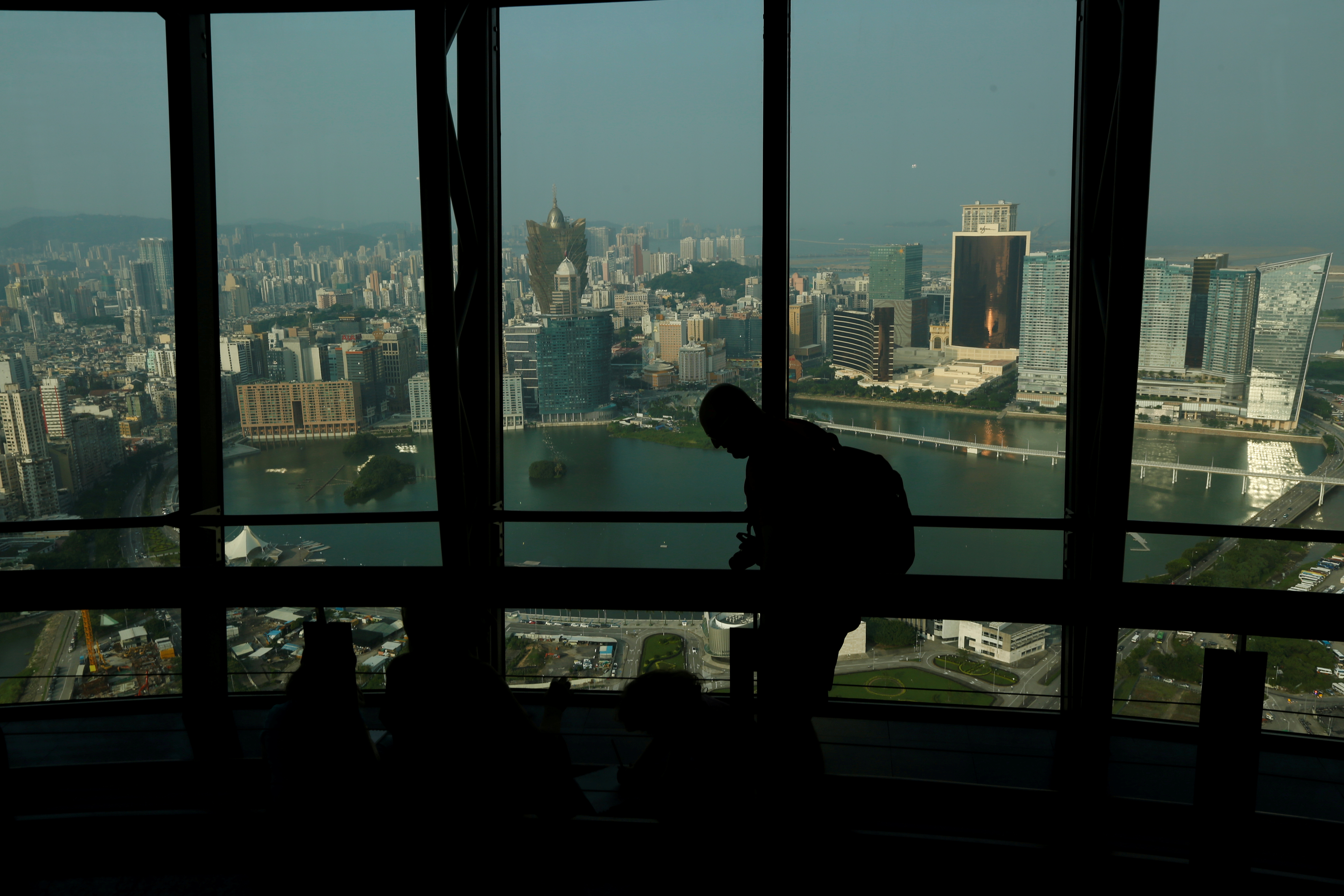
Sign up here.
Reporting by Farah Master, Twinnie Siu and Beijing newsroom; Editing by Kim Coghill, Kenneth Maxwell and Edmund Klamann
Our Standards: The Thomson Reuters Trust Principles. New Tab , opens new tab
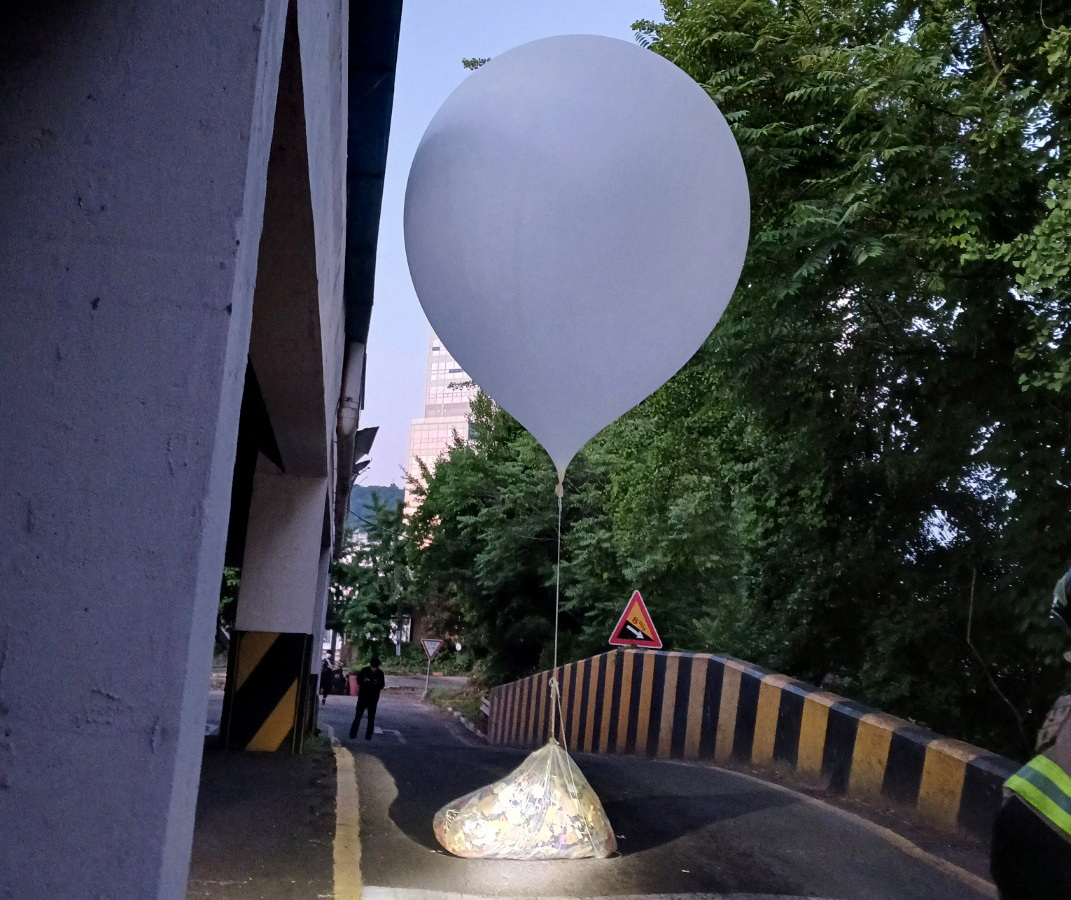
World Chevron
The U.S.-led Indo-Pacific Economic Framework is holding a ministerial meeting this week in Singapore, including major firms joining a "Clean Economy" investor forum to boost infrastructure and climate investments across the region.
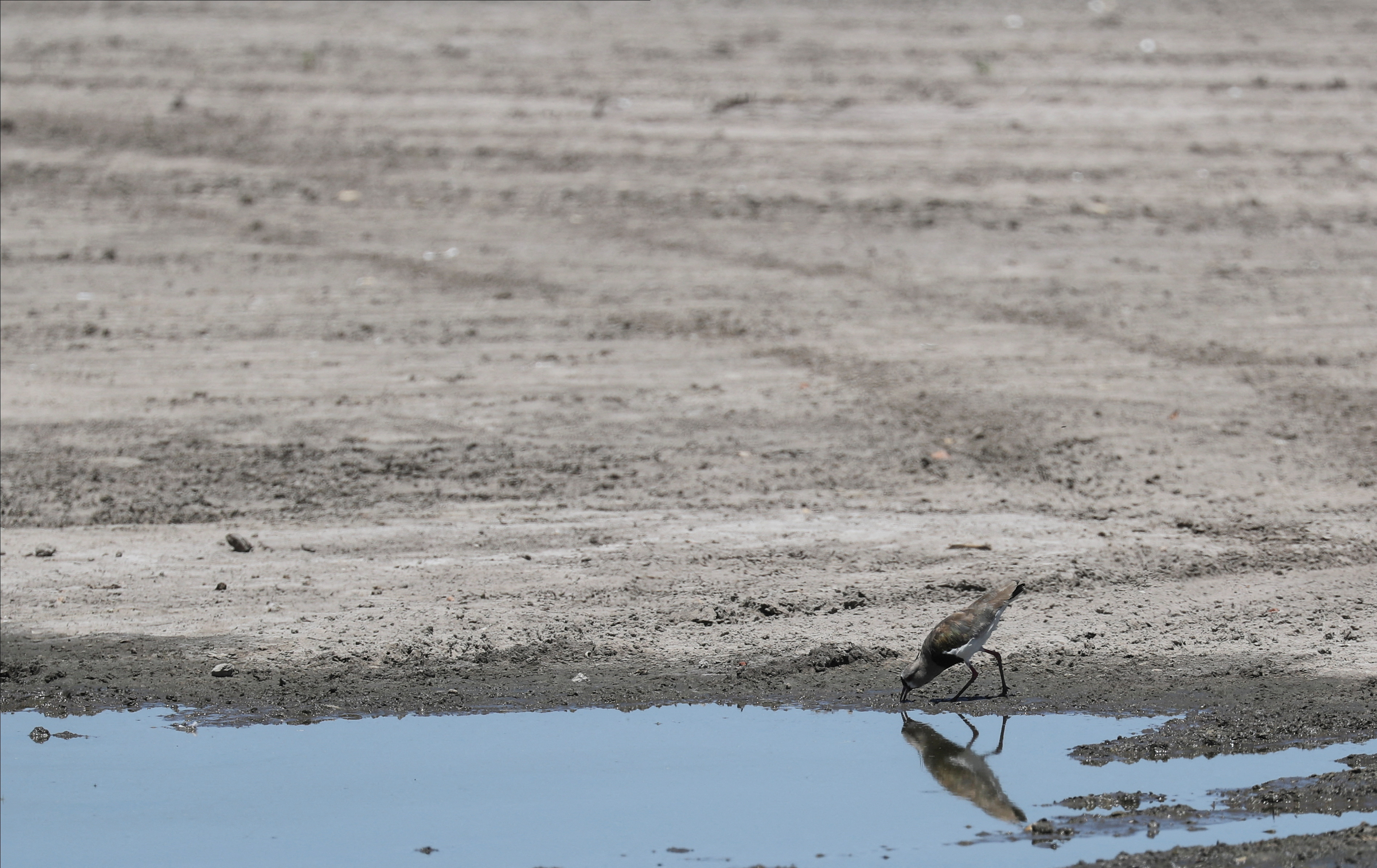
A number of people were killed in an Israeli air attack targeting sites in the vicinity of the Syrian city of Aleppo on Monday, Syrian state media said citing a military source, the second reported attack on the country in less than a week.
Tanzania and Ethiopia said they had signed accords with South Korea for loans of billions of dollars, part of broader deals that will give the Asian nation access to Africa's crucial mineral resources and vast export market.

- Countries & Regions
- International Organisations (IOs)
- Climate Change
- Counter Terrorism
- Disarmament
- Cybersecurity
- International Peacekeeping
- Singapore's Voluntary National Review
- Small States
- Sustainable Development
- Pedra Branca
- Singapore Universal Periodic Review
- Water Agreements
- Find A Singapore Overseas Mission
- Foreign Representatives To Singapore
- COVID-19 Information
- Travel Tips
- Visa Information
- I Need Help Overseas
- Passport Matters
- Legalisation of Documents
- Travel Advisories and Notices
- Useful links
- Press Statements, Transcripts & Photos
- Announcements and Highlights
- Experience Singapore
- Foreign Service Officer (Functional and Corporate)
- Foreign Service Officer (Political and Economic)
- Foreign Service Administration Specialist
- Job Opportunities
- Pre-University
- Undergraduate
- Foreign Service Scholarships
- Recruitment
- Scholarship
- Reach.gov.sg
Expand All | Collapse All
Travelling to Singapore
Travellers should refer to the ICA website for the latest information on travelling to/from or transiting through Singapore. For the latest updates on Singapore’s COVID-19 situation and related travel advisories, please refer to the MOH website at https://www.moh.gov.sg/covid- 19 .
Entry and Exit
Travellers are advised to refer to the official Macao SAR COVID-19 website for the relevant anti-epidemic measures before departing for Macao.
Singaporeans can visit Macao for up to 30 days without a visa. If you plan to stay more than 30 days, you will need to obtain an extension from the Macao Immigration Department.
If you plan to work or study in Macao, you must obtain a visa prior to arriving in Macao. For the latest visa requirements, please contact your travel agency , the Embassy of the People’s Republic of China in Singapore, or the Macao Public Security Police Force Border Control Department .
Customs Regulations: Travellers who fail to declare to customs officers in accordance with Macao law, or make false or incomplete declarations; or import goods that are subject to pre-licencing system without relevant licences (e.g., firearms, medications and endangered species of animals and plants); or import/export counterfeit or infringing goods, can be subject to prosecution, and the relevant items will be seized. Please refer to the Macao Customs Service’s website for further information.
Safety and Security
Macao’s crime rate is generally low but pickpocketing and other street crime can occur. Singaporeans are advised to take extra care of personal belongings including travel document, money, and valuables in crowded areas, and while travelling on public transportation.
Drugs: Do not become involved with illicit drugs in any kind. Any person who traffics, manufactures, has in possession, or uses any dangerous drugs shall be liable upon conviction to a fine and imprisonment (see here ).
Stay in legal accommodation: When visiting Macao, Singaporeans should lodge in licensed hotels or inns, and not stay in illegal accommodation operated without a license. At present, there is no legal ‘family hostel’ or ‘Bed and Breakfast’ in Macao. You face a fine of MOP 3,000 if you are found staying in illegal premises. In case of doubt about the legality of the premise where you are staying, please check with the Macao Government Tourism Office by calling +853 2831 5566 or consulting their website .
Photography: Taking photos or recordings without consent, or against the will of the relevant parties is against the law, and person shall be liable upon conviction to imprisonment and a fine (see Article no. 191 of Penal Code ).
It is prohibited to record images or sounds in casinos, and to use mobile phones or other communication devices within three metres around gambling tables (see here ).
Additional Information
The typhoon seasons in Macao normally runs from May to October, where the peak extends from July to September. Typhoons may cause flooding and landslides. Local warnings are issued in advance. Public offices and public transportations will shut down when Typhoon Signal No. 8 and above is hoisted.
We advise Singaporeans to monitor local weather updates from the Macao Meteorological and Geophysical Bureau’s website and heed the advice of the local authorities.
General Travel Advice
Overseas Travel – Be Informed & Be Safe [Updated on 5 February 2024]
Singaporeans planning overseas travel are reminded to take the necessary precautions, including being prepared to deal with accidents, natural disasters or terrorist attacks. Singaporeans are also reminded to be familiar with your destination’s local laws, customs, and COVID-19 regulations.
Demonstrations do occur in major cities across the world. Such demonstrations can sometimes escalate into violence. It is important for Singaporeans to keep abreast of local news, avoid any protests or demonstrations and heed the advice of the local authorities.
When participating in outdoor leisure activities overseas, Singaporeans should be mindful that certain sporting activities, especially in open seas, may carry risks. Besides ensuring that one has the physical competencies and appropriate condition to undertake the activity, every effort should be made to ascertain if the trip organiser or guide is reliable and competent, and that appropriate safety and contingency plans are in place. When in doubt, Singaporeans should consult the relevant professional bodies or sporting associations for specific advice.
For those planning to travel, here are some tips:
Before travelling
- Familiarise yourself with our network of overseas missions.
- Purchase comprehensive travel insurance and be familiar with the terms and coverage.
- Equip yourself with research about your destination’s entry requirements, current situation, local laws and customs.
- eRegister with us on our website ( www.mfa.gov.sg ) so that we may reach out to you during an emergency.
While travelling
- Always take care of your personal safety, remain vigilant and monitor local weather news, advisories, and security developments.
- Exercise caution around large gatherings and avoid locations known for demonstrations or disturbances.
- Be prepared for possible delays and last-minute changes in travel plans especially during unforeseen events such as natural disasters, social unrest or terror attacks.
- Stay connected with your friends and family. Inform them of your whereabouts and provide them with your overseas contact details.
- In the event that you require consular assistance, please contact the nearest Singapore Overseas Mission or call the Ministry of Foreign Affairs Duty Office at +65 6379 8800/+65 6379 8855.
Advisory: Email Scams
There have been reports of individuals receiving scam emails/messages purportedly sent from friends in distress overseas. These emails/messages typically originate from an email address/social media known to the receiver bearing claims of the sender getting into trouble overseas and urgently requesting financial assistance. The sender would also claim to have approached a Singapore Embassy/Consulate and the local Police for help to no avail.
MFA takes the safety of all Singaporeans very seriously. Singaporeans in distress approaching our Overseas Missions for assistance will be rendered with all necessary consular assistance. If you receive such emails/messages from purported friends seeking funds transfers, we strongly advise you to call them first to verify the authenticity of the emails/messages before responding to their request. It is also not advisable to give out any personal information such as NRIC/passport numbers, address, telephone number, etc. Any form of reply, even one of non-interest, could result in more unsolicited emails. Members of the public who suspect that they have fallen prey to such scams should report the matter to the Police immediately. Should Singaporeans abroad require consular assistance, they can contact the nearest Singapore Overseas Mission or call the Ministry of Foreign Affairs 24-hr Duty Office at +65 6379 8800/+65 6379 8855.
The Ministry of Foreign Affairs is a ministry of the Government of Singapore responsible for conducting and managing diplomatic relations between Singapore and other countries and regions.
Travel Page

Search Smartraveller

Latest update
Exercise a high degree of caution in Hong Kong.
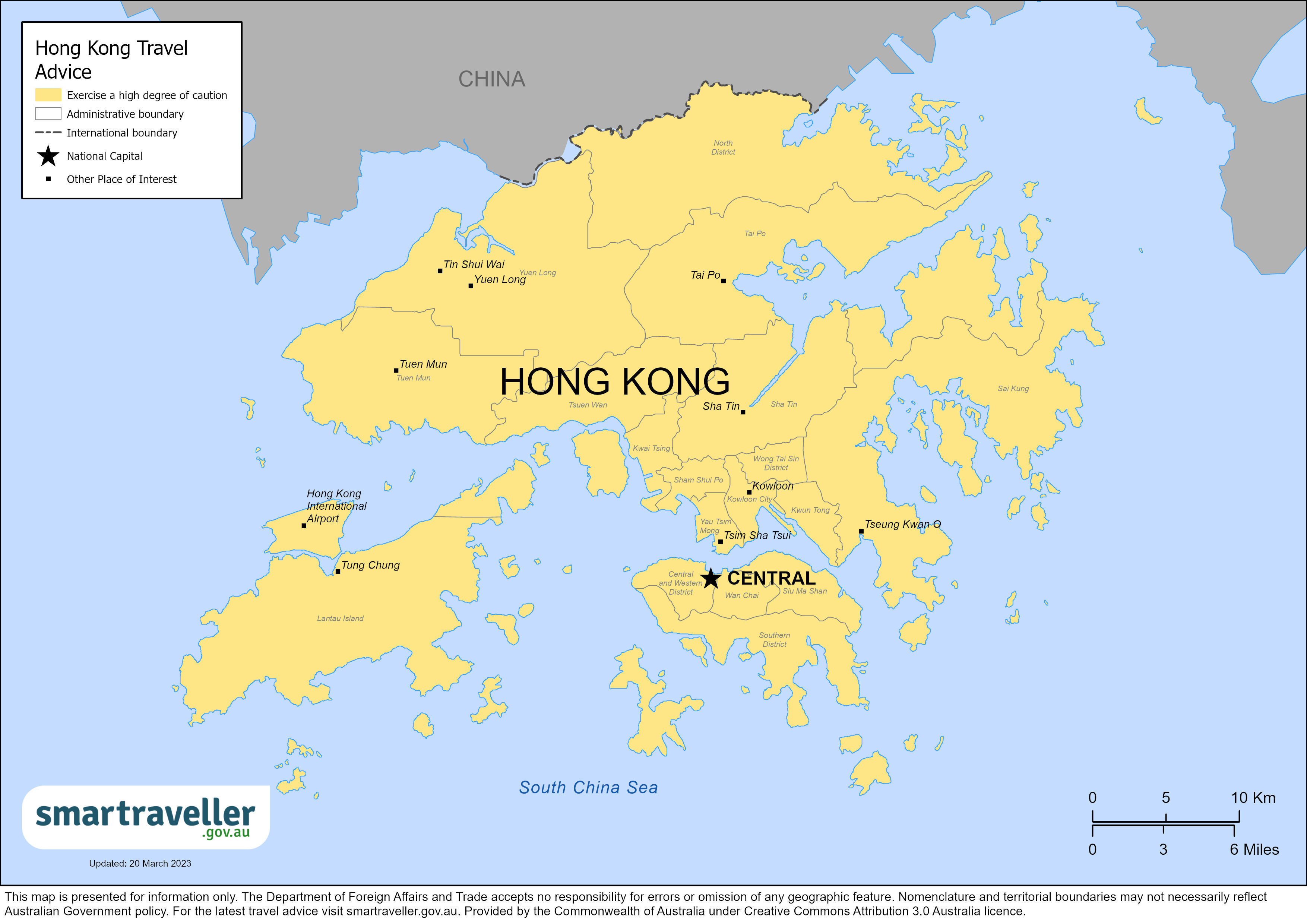
Hong Kong (PDF 368.67 KB)
Asia (PDF 2.21 MB)
Local emergency contacts
Fire and rescue services, medical emergencies, advice levels.
Exercise a high degree of caution in Hong Kong.
Exercise a high degree of caution in Hong Kong.
- The Hong Kong Government strictly controls demonstrations. Authorities may arrest protesters. Avoid protests and large gatherings. Don't photograph or video protests.
- Violent crime is rare, but some petty crime happens. Thieves target tourist spots and crowded places, such as markets and trains. Take care of your belongings.
- Drink spiking happens. Don't accept food, drink, cigarettes or gum from strangers, and don't leave your food or drinks unattended.
- Scammers may ask for help carrying luggage or ask for money. Never carry anything for someone you don't know. Do thorough research. Get legal advice before sending money or signing documents.
- Hong Kong experiences typhoons. If the warning level is Typhoon 8 or Black Rain Signal, businesses, transport services and the Australian Consulate-General will close. Follow advice from local officials. Contact your travel operator about delays.
Full travel advice: Safety
- It's illegal to carry sleeping tablets and some medication without a prescription. Carry a copy of your prescription or a letter from your doctor.
- Hong Kong can have very high pollution levels and has very high humidity from May to October. If you have a heart or breathing condition, do less physical activity when the air quality index health risk is high and reduce physical and outdoor activities on very humid days.
- Hand, foot and mouth disease (HFMD) is common. Wash your hands thoroughly and often.
- Waterborne, foodborne, and other infectious diseases, including tuberculosis and hepatitis, can occur. Avoid raw or undercooked food. Avoid contact with animals.
Full travel advice: Health
- Hong Kong's 2024 Safeguarding National Security Law includes additional national security offences. You could be detained without charge for up to 16 days and denied access to a lawyer for up to 48 hours.
- The 2024 Safeguarding National Security Law and the 2020 National Security Law may be interpreted broadly. The laws could be applied to activities that occurred outside Hong Kong, including social media posts. You could break the law without intending to. You may be at increased risk of detention. The maximum penalty under these laws in Hong Kong is life imprisonment. The Australian Government can't intervene in the Hong Kong judicial process. Denial of entry to Hong Kong is also possible.
- Don't use, carry or traffic illegal drugs. Penalties include heavy fines and jail time.
- Cannabidiol (CBD) is listed as a dangerous drug in Hong Kong. Possession and consumption carries a maximum penalty of seven years imprisonment. Trafficking and illicit manufacturing carries a maximum penalty of life imprisonment.
- It's illegal to take part in public demonstrations without Hong Kong government approval. Avoid large public gatherings.
- Chinese law doesn't recognise dual nationality. The Australian Government may be unable to help if you enter Hong Kong on a travel document other than your Australian passport or if you're deemed a Chinese national. If you're travelling from Hong Kong to Macau or mainland China, use your Australian passport.
- Hong Kong law allows dual nationals of Chinese descent to register their Australian nationality with the Immigration Department . If Hong Kong authorities consider you a citizen of China, they may refuse to grant you access to Australian consular services. This will prevent the Australian Government from providing you with those services.
Full travel advice: Local laws
- Hong Kong has separate immigration regulations to China. You generally won't need a tourist visa if you stay less than 90 days. In all other cases, you'll need a visa. Contact the Hong Kong Economic and Trade Office in Sydney for details.
- If you're travelling from Hong Kong to mainland China, you'll need a PRC visa.
Full travel advice: Travel
Local contacts
- The Consular Services Charter details what we can and can't do to help you overseas.
- For consular assistance, contact the Australian Consulate-General in Hong Kong .
- To stay up to date with local information, follow the Consulate-General's social media accounts.
Full travel advice: Local contacts
Full advice
Civil unrest and political tension.
Public protests and events that draw large groups of people can turn violent. The Hong Kong Government prohibits demonstrations that they haven't approved. Authorities may arrest protesters. Avoid protests, demonstrations and large gatherings. Don't photograph, film or participate in protests or other acts that authorities may consider provocative.
If there are signs of disorder, move away quickly and seek shelter in a safe place.
Increased screening, including of digital devices, is possible for travellers crossing between Hong Kong and mainland China.
To stay safe during civil unrest:
- avoid large gatherings and protests
- monitor the media for possible unrest and avoid those areas
- follow the advice of local authorities
More information:
- Demonstrations and civil unrest
- Transport Department – special traffic news
- Hong Kong Police Facebook
- Hong Kong Police 'X' (formerly Twitter): @hkpoliceforce
- Local media: South China Morning Post or RTHK English news
Terrorism is a threat worldwide.
Terrorist threats
Petty crime
There's little violent crime in Hong Kong. You could encounter pickpocketing and street theft.
Thieves target tourist spots and crowded places such as markets and trains.
Take care of your belongings, especially in crowded places.
Drink spiking
Drink spiking happens. To reduce your risk of drink spiking:
- be careful of people who approach you in bars
- don't accept drinks, food, gum or cigarettes from strangers or new friends
- don't leave food or drinks unattended
Partying safely
Scams against Australian travellers are increasing.
Criminals sometimes present themselves as people in need.
One scam starts via the internet. A person might offer you gift cards or money to help carry someone's luggage on an international flight. They may ask for your money, credit card or online bank account details.
Other reported scams involve:
- fake arrests
- holiday club or timeshare schemes
- scratch lottery tickets
- foreign lottery schemes
- relationships
Be wary of strangers asking for your help.
Never carry anything for anyone you don't know and trust, especially when crossing international borders. There's a risk that criminals have hidden drugs or other illegal items inside.
To avoid becoming a victim of a scam:
- don't send money or give credit card or bank account details to anyone you don't know and trust
- thoroughly research any scheme or agreement before signing or paying money
- seek legal advice before signing any property contract
Cyber security
You may be at risk of cyber-based threats during overseas travel to any country. Digital identity theft is a growing concern. Your devices and personal data can be compromised, especially if you're connecting to Wi-Fi, using or connecting to shared or public computers, or to Bluetooth.
Social media can also be risky in destinations where there are social or political tensions, or laws that may seem unreasonable by Australian standards. Travellers have been arrested for things they have said on social media. Don't comment on local or political events on your social media.
More information:
- Cyber security when travelling overseas
Kidnapping can happen anywhere, anytime, including in destinations that are typically at lower risk.
The Australian Government's longstanding policy is that it doesn't make payments or concessions to kidnappers.
More information:
- Kidnapping
Climate and natural disasters
Hong Kong experiences typhoons and very heavy rain.
Local safety rules require businesses and transport services to close during typhoons or very heavy rain.
The Australian Consulate-General in Hong Kong closes when the 'Typhoon 8' or 'Black Rain' signal is given.
Authorities may delay or suspend flights and ferries into and out of Hong Kong. Contact your travel operator or airline to find out about delays.
If there's a typhoon:
- monitor weather forecasts and plan accordingly
- know your hotel or cruise ship's evacuation plans
- secure your passport in a safe, waterproof location
- take official warnings seriously
If there's a natural disaster or severe weather :
- monitor the news and other local information sources
- monitor the Global Disaster Alert and Coordination System
- keep in contact with friends and family
Hong Kong Observatory
Travel insurance
Get comprehensive travel insurance before you leave.
Your policy needs to cover all overseas medical costs, including medical evacuation. The Australian Government won't pay for these costs.
If you can't afford travel insurance, you can't afford to travel. This applies to everyone, no matter how healthy and fit you are.
If you're not insured, you may have to pay many thousands of dollars up-front for medical care.
- what activities and care your policy covers
- that your insurance covers you for the whole time you'll be away
Physical and mental health
Consider your physical and mental health before you travel, especially if you have an existing medical condition.
See your doctor or travel clinic to:
- have a basic health check-up
- ask if your travel plans may affect your health
- plan any vaccinations you need
Do this at least 8 weeks before you leave.
If you have immediate concerns for your welfare or the welfare of another Australian, call the 24-hour Consular Emergency Centre on +61 2 6261 3305 or contact your nearest Australian Embassy, High Commission or Consulate to discuss counselling hotlines and services available in your location.
- General health advice
- Healthy holiday tips (Healthdirect Australia)
Medications
Not all medication available over the counter or by prescription in Australia is available in other countries. Some may even be considered illegal or a controlled substance, even if prescribed by an Australian doctor.
If you plan to bring medication, check if it's legal in Hong Kong. Take enough legal medicine for your trip.
It's illegal to have sleeping tablets and certain other medications without a prescription. These include medications used to treat erectile dysfunction or anxiety.
Carry a copy of your prescription or a letter from your doctor stating:
- what the medicine is
- your required dosage
- that it's for personal use
- Hong Kong Customs and Excise Department
Health risks
Hong Kong experiences very high humidity during summer, from May to October.
Reduce physical exertion and outdoor activities on very humid days.
Air pollution
High levels of air pollution may trigger bronchial, sinus or asthma conditions.
If you have an existing heart or breathing difficulties, reduce physical and outdoor activities on days with high pollution.
You can monitor real-time air quality index reports for Hong Kong.
Insect-borne diseases
Outbreaks of mosquito-borne illnesses, including dengue , sometimes occur.
To protect yourself from disease:
- ensure your accommodation is insect-proof
- use insect repellent
- wear long, loose, light-coloured clothing
Hand, foot and mouth disease
Hand, foot and mouth disease (HFMD) is common. Serious outbreaks sometimes occur. Outbreaks usually start in March or April and peak in May. Sometimes they last until October.
HFMD mostly affects children aged younger than 10 years, but adult cases, particularly in young adults, occur.
HFMD is spread by direct contact with discharges of infected people.
Practice good hygiene. Wash your hands carefully and frequently.
Other health risks
Waterborne, foodborne, and other infectious diseases occur sometimes. These include:
- tuberculosis
- Japanese encephalitis
To protect yourself from illness:
- drink only filtered water or bottled water
Seek medical advice if you have a fever or diarrhoea.
Bird flu (avian influenza)
Human cases of avian influenza A (H7N9) have been reported in mainland China.
The Hong Kong Special Administrative Region (SAR) Government is currently at 'Alert' response level for avian influenza. This is the lowest level in the 3-tier alert system.
To protect yourself from avian influenza:
- wash your hands often
- use good food safety practices
- avoid contact with animals
- Department of Health and Aged Care
- World Health Organisation
- Hong Kong Centre for Health Protection
Medical care
Medical facilities.
Medical services and facilities are of a high standard.
Costs can be higher than in Australia.
Private hospitals may require you to confirm your insurance cover or pay a deposit up-front before they will admit you.
You're subject to all local laws and penalties, including those that may appear harsh by Australian standards. Research local laws before travelling.
Hong Kong's 2024 Safeguarding National Security Law includes additional national security offences. You could be detained without charge for up to 16 days and denied access to a lawyer for up to 48 hours. People arrested under national security laws have faced lengthy periods on remand while their cases are heard by Hong Kong courts. The 2024 Safeguarding National Security Law and the 2020 National Security Law may be interpreted broadly. The laws could be applied to activities that occurred outside Hong Kong, including social media posts. You could break the laws without intending to, and you may be at increased risk of detention. The maximum penalty under these laws in Hong Kong is life imprisonment. Under the new security laws, you could be deported or face possible transfer to mainland China for prosecution under mainland law. Denial of entry to Hong Kong is also possible. Hong Kong authorities have issued arrest warrants against individuals living outside Hong Kong, including in Australia. Hong Kong authorities have also offered financial rewards for information on those individuals.
If you're arrested or jailed, the Australian Government will do what it can to help you under our Consular Services Charter . But we can't get you out of trouble or out of jail.
The Australian Government can't intervene in the Hong Kong judicial process.
If local authorities consider you a citizen of China, they may refuse to grant you access to Australian consular services. This will prevent the Australian Government from providing you with those services.
Possessing illegal drugs of any kind, including marijuana, can result in penalties that include heavy fines and jail time.
Officials have arrested many foreigners for trafficking drugs.
Cannabidiol (CBD) has been listed as a dangerous drug under the control of the Dangerous Drugs Ordinance (Chapter 134, Laws of Hong Kong) (DDO) in Hong Kong. Possession and consumption carries a maximum penalty of seven years imprisonment. Trafficking and illicit manufacturing of CBD carries a maximum penalty of life imprisonment.
Importing weapons
Strict rules control the import or possession of:
- any type of weapon
- any item that looks like a weapon, including replicas, antiques, toys and fashion accessories
Hong Kong has prosecuted foreigners, including Australians, for possessing:
- stunning devices such as taser guns
- dart and spear guns
- knuckledusters
- extendable batons
- tear gas and pepper spray
You can import, possess or purchase such items legally, including from local Hong Kong markets. To do this, you must get a permit from local authorities in advance.
These laws apply to people in Hong Kong and those transiting Hong Kong airport.
If authorities find you carrying such items (including in your luggage), they may arrest, fine or detain you.
Importing Products
Hong Kong has strict import rules. If you don't follow these rules, you could be fined and/or imprisoned.
Hong Kong Customs - Prohibited/ Controlled Articles
It's illegal to:
- take part in public demonstrations without Hong Kong government approval
- take photos of military installations
Australian laws
Some Australian criminal laws still apply when you're overseas. If you break these laws, you may face prosecution in Australia.
Staying within the law
Dual citizenship
The Nationality Law of the People's Republic of China applies in the Hong Kong Special Administrative Region (HKSAR). Under this law, dual citizenship is not legally recognised in Hong Kong. However, Hong Kong's law allows dual nationals of Chinese descent to register their Australian nationality.
Register with the Hong Kong Immigration Department if you wish to be considered a national of Australia.
If you're an Australian-Chinese dual national, you can make a Declaration of Change of Nationality. Find out what the consequences of this are from the Hong Kong Immigration Department .
If local authorities consider you a citizen of China they may refuse you access to Australian consular services. This can happen even if you entered Hong Kong on an Australian or other foreign passport, and you:
- haven't renounced your Chinese citizenship according to Chinese law
- haven't formally advised the Chinese authorities of your Australian citizenship
- continue to maintain a passport issued by the Hong Kong Special Administrative Region or by China.
Authorities may not allow certain categories of Chinese citizens, such as state officials, to renounce their Chinese nationality under Chinese law.
Get professional legal advice if you're not sure of your citizenship status under Chinese law.
If you plan to enter mainland China or Macau from Hong Kong, travel on your Australian passport .
Local authorities may not allow consular access if you enter Hong Kong on a travel document other than your Australian passport, or if local authorities identify you as a Hong Kong or Chinese national. More information:
- Dual nationals
- China Travel Advice
LGBTQIA+ travellers
Most locals accept or are indifferent to LGBTI travellers. However, community attitudes towards LGBTI people are generally more conservative than in Australia.
Visas and border measures
Every country or territory decides who can enter or leave through its borders. For specific information about the evidence you'll need to enter a foreign destination, check with the nearest embassy, consulate or immigration department of the destination you're entering.
Hong Kong is a Special Administrative Region (SAR) of China. This means it has separate immigration regulations from those of the People's Republic of China.
Entry and exit conditions can change at short notice. For details about visas, currency, customs and quarantine rules, contact:
- the Hong Kong Economic and Trade Office in Sydney
- the Hong Kong Special Administrative Region Immigration Department
If you plan to travel between Hong Kong and mainland China, you'll need a visa.
If you plan to return to China after visiting Hong Kong, get a multiple-entry visa for China. If you don't get this visa, you'll need a new visa to re-enter China. Get your visa before leaving Australia.
If you've recently changed your passport, but your Chinese visa is still in the old passport, take both passports with you. Officials may ask you to present your previous passport and Chinese visa.
China travel advice
Border measures
Your temperature may be checked on arrival in Hong Kong. For the latest requirements, see Hong Kong inbound travel arrangements or contact your airline or travel agent.
Transit via Hong Kong
Refer to the Hong Kong International Airport website or contact your airline or travel agent for details on transiting Hong Kong.
- Hong Kong International Airport
Hong Kong Transport Department
Some countries won't let you enter unless your passport is valid for 6 months after you plan to leave that country. This can apply even if you're just transiting or stopping over.
Some foreign governments and airlines apply the rule inconsistently. Travellers can receive conflicting advice from different sources.
You can end up stranded if your passport is not valid for more than 6 months.
The Australian Government does not set these rules. Check your passport's expiry date before you travel. If you're not sure it'll be valid for long enough, consider getting a new passport .
Lost or stolen passport
Your passport is a valuable document. It's attractive to people who may try to use your identity to commit crimes.
Some people may try to trick you into giving them your passport. Always keep it in a safe place.
If your passport is lost or stolen, tell the Australian Government as soon as possible:
- In Australia, contact the Australian Passport Information Service .
- If you're overseas, contact the nearest Australian embassy or consulate .
Passport with 'X' gender identifier
Although Australian passports comply with international standards for sex and gender, we can't guarantee that a passport showing 'X' in the sex field will be accepted for entry or transit by another country. Contact the nearest embassy, high commission or consulate of your destination before you arrive at the border to confirm if authorities will accept passports with 'X' gender markers.
- LGBTQIA+ travellers
The currency in Hong Kong is the Hong Kong Dollar (HKD).
Under Hong Kong law, travellers in and out of Hong Kong may need to declare cash. Make a written declaration if you're carrying more than HKD120,000 or equivalent in cash.
You can change Australian dollars for HKD at local currency exchanges and banks.
Credit cards are widely accepted.
Take care when using ATMs, as petty crime occurs. See Safety
Local travel
Accommodation.
Unlicensed guesthouses providing low-cost accommodation operate in Hong Kong. They may not follow the safety standards set for licensed guesthouses. Don't risk your safety or security.
If you choose to stay in a guesthouse, confirm it's licensed.
Home Affairs Department of Hong Kong
Driving permit
You can drive in Hong Kong for up to 12 months if you have a valid Australian driver's licence or International Driving Permit (IDP).
Make sure your insurance covers you if you drive without a Hong Kong driver's licence.
If you're residing in Hong Kong, then you should only drive using a Hong Kong driver's licence.
Police should be called to attend the site of a car, motorcycle or bike accident. A police report reference number will be required for insurance claims.
Road travel
Hong Kong has a well-developed road network of similar standards to a large Australian city.
Check you have adequate insurance before driving.
Find out about local road rules and practices.
Driving or riding
Motorcycles
Check your insurance covers you for riding motorbikes.
Most travel insurance policies won't cover you if you don't follow local laws or wear a helmet.
Always wear a helmet.
Use only licensed taxis or reputable limousine services. Arrange them through your hotel if you can. Always insist that the meter is used.
Be prepared to pay cash for your Hong Kong taxi.
If you have an issue with a taxi driver, ask for a receipt. Then record the taxi driver's licence number and contact the police.
Public transport
Hong Kong has an extensive public transport system. It includes the MTR, buses, ferries and trams.
- Public transport in Hong Kong
- Transport and getting around safely
Ferries are a common mode of transport between Hong Kong, Macau and the Chinese mainland.
Some cruise lines stop over in Hong Kong.
- Travelling by boat
- Going on a cruise
DFAT doesn't provide information on the safety of individual commercial airlines or flight paths.
Check Hong Kong's air safety profile on the Aviation Safety Network.
Emergencies
Depending on what you need, contact your:
- family and friends
- travel agent
- insurance provider
Always get a police report when you report a crime.
Your insurer should have a 24-hour emergency number.
Consular contacts
Read the Consular Services Charter for what the Australian Government can and can't do to help you overseas.
For consular assistance, contact the Australian Consulate-General in Hong Kong.
Australian Consulate-General, Hong Kong
23/F Harbour Centre, 25 Harbour Road
Wanchai, Hong Kong
Phone: (+852) 2827 8881
Fax: (+852) 2585 4457
Website: https://hongkong.consulate.gov.au/
Facebook: Australia in Hong Kong and Macau
X: @AusCGHK
Check the Consulate-General website for details about opening hours and any temporary closures.
24-hour Consular Emergency Centre
In a consular emergency, if you can't contact an embassy, call the 24-hour Consular Emergency Centre on:
- +61 2 6261 3305 from overseas
- 1300 555 135 in Australia

Travelling to Hong Kong?
Sign up to get the latest travel advice updates..
Be the first to know official government advice when travelling.

Hong Kong Free Press HKFP
Hong Kong news, breaking updates – 100% Independent, impartial, non-profit
Hong Kong’s redevelopment body to hold free ‘citywalk’ tours to showcase city’s history and vibrance

- Click to share on X (Opens in new window)
- Click to share on Facebook (Opens in new window)
- Click to share on LinkedIn (Opens in new window)
- Click to share on Mastodon (Opens in new window)
- Click to share on WhatsApp (Opens in new window)
- Click to share on Reddit (Opens in new window)
- Click to share on Telegram (Opens in new window)
- Click to print (Opens in new window)
The Urban Renewal Authority (URA), the city’s redevelopment body, has announced a series of free “citywalk” tours in Central and Sheung Wan to showcase Hong Kong’s history and vibrance.

The body will hold 40 guided tours in October catering to over 500 local residents or tourists, URA’s managing director Wai Chi-sing said on Sunday.
These tours will highlight the URA’s redevelopment projects as well as historic spots, shops and street art in Central and Sheung Wan, Wai said.
The tours will feature the three themes – history and architecture; food and community; and art and culture.
The URA will recruit and train tour guides, targeting Central and Sheung Wan residents in particular, Wai added.
The Central and Sheung Wan neighbourhood is home to a number of the URA’s completed redevelopment projects, including Central Market and Pak Tsz Lane Park near PMQ. It is also the site of a 67,200 square metres redevelopment project in the vicinity of Peel Street and Graham Street. The redevelopment involves plans for residential buildings, courtyard spaces, a multi-purpose activity hall, a hotel and other structures.
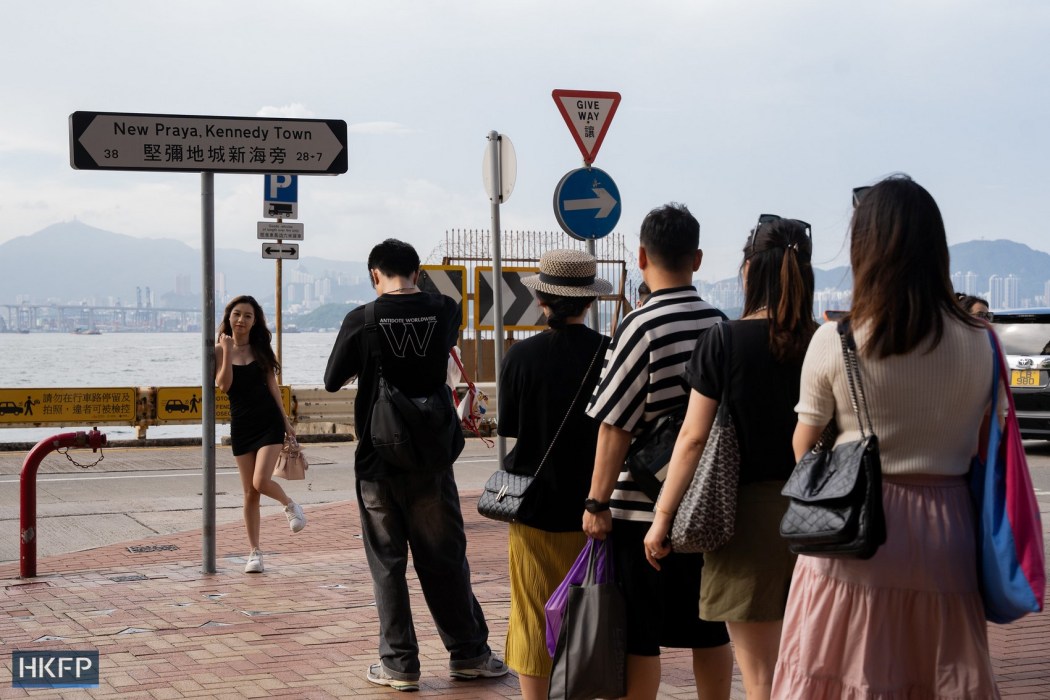
Citywalk, a style of tourism that promotes exploring the city on foot and taking photos, has become popular especially among mainland Chinese tourists in the post-pandemic era .
“While conducting urban renewal projects, the URA not only strives to improve people’s living conditions and quality, but to bring vibrance to old communities with different approaches, to strengthen connections among different stakeholders and enhance a community’s uniqueness… thereby boosting the district’s economy and support the development of tourism,” Wai wrote in Chinese.
The Central and Sheung Wan tours will be part of the project’s pilot scheme. The managing director said he also hoped to hold tours in other parts of the city after the scheme, including in Kowloon City and the Flower Market – both districts with large-scale URA redevelopment projects.
‘Urban decay’
Established in 2001, the URA was granted powers by the government to purchase land from private owners and sell land to developers to address “urban decay” and improve living conditions in old districts.

Over the past 10 years, it has been accused of transforming places of culture and history into homogenous shopping malls and high-end residential estates in the process of redevelopment.
Its recent proposal to redevelop the Flower Market district in Mong Kok triggered criticism from residents, florists, scholars, pro-establishment lawmakers who have questioned the looming commercialisation and expressed concern that the project could destroy the vibrancy of the century-old market .
Support HKFP | Policies & Ethics | Error/typo? | Contact Us | Newsletter | Transparency & Annual Report | Apps
Help safeguard press freedom & keep HKFP free for all readers by supporting our team

LATEST FROM HKFP
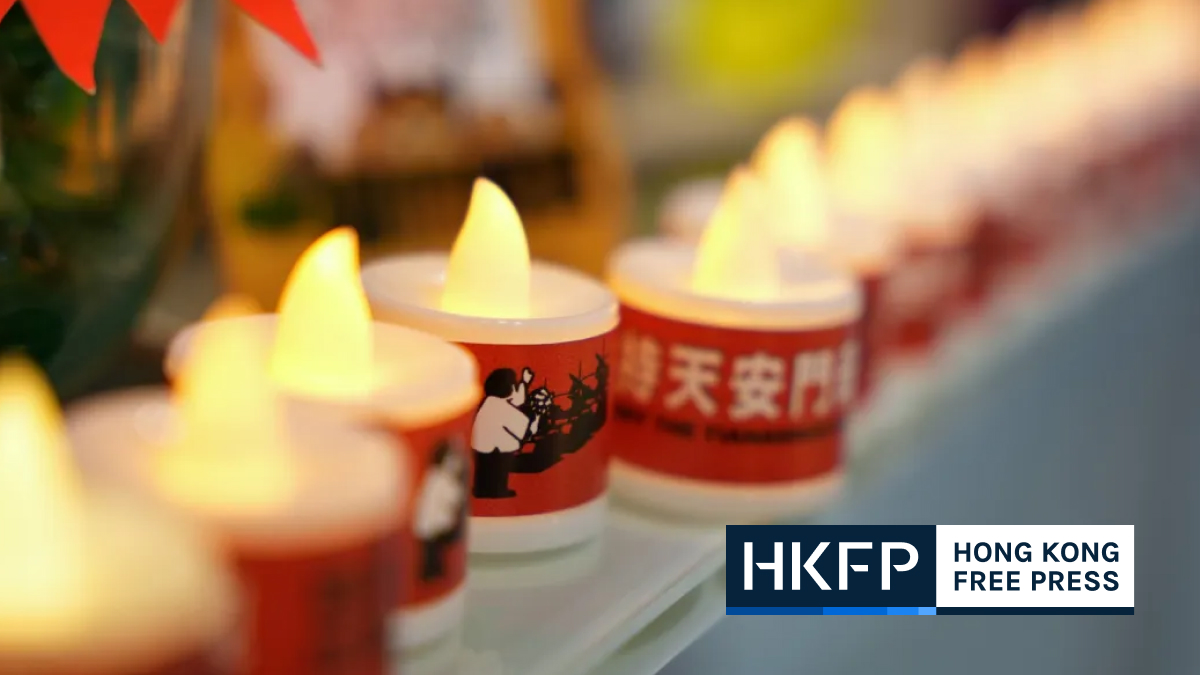
Hong Kong’s Catholic Diocese axes third consecutive Tiananmen mass as cardinal urges ‘forgiveness’ over crackdown
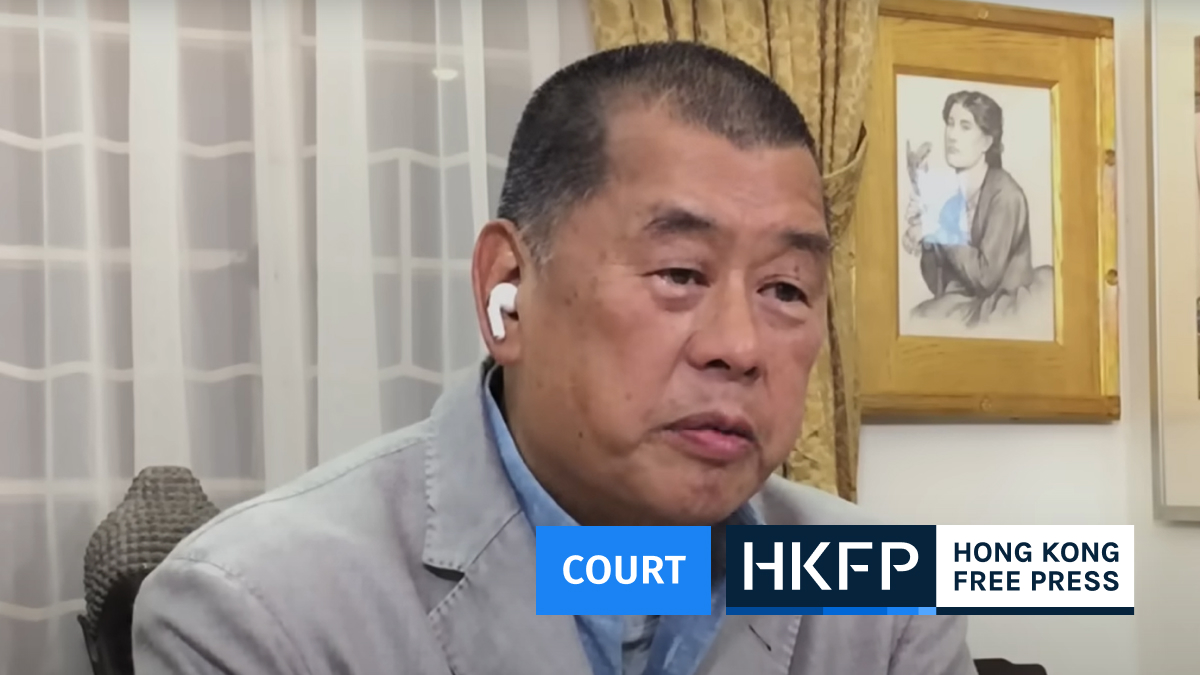
Trial of Jimmy Lai adjourned after pro-democracy media tycoon appears to be unwell in Hong Kong court
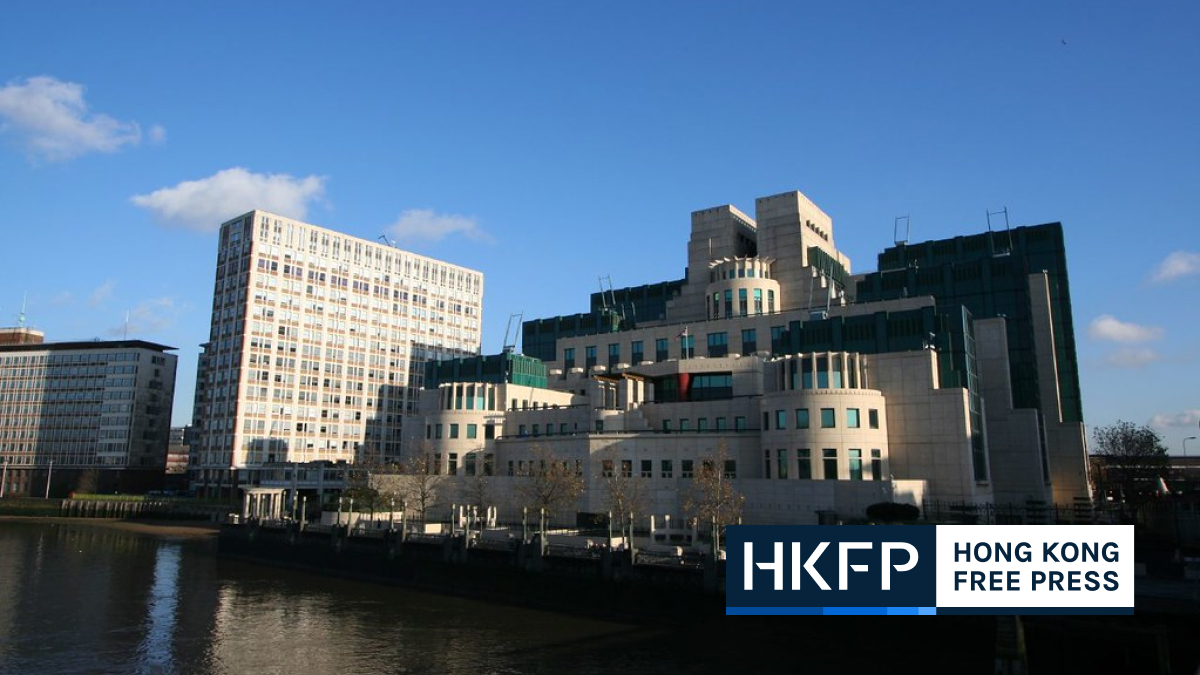
China accuses Britain’s MI6 of recruiting couple who worked for ‘central state agency’ to spy for UK
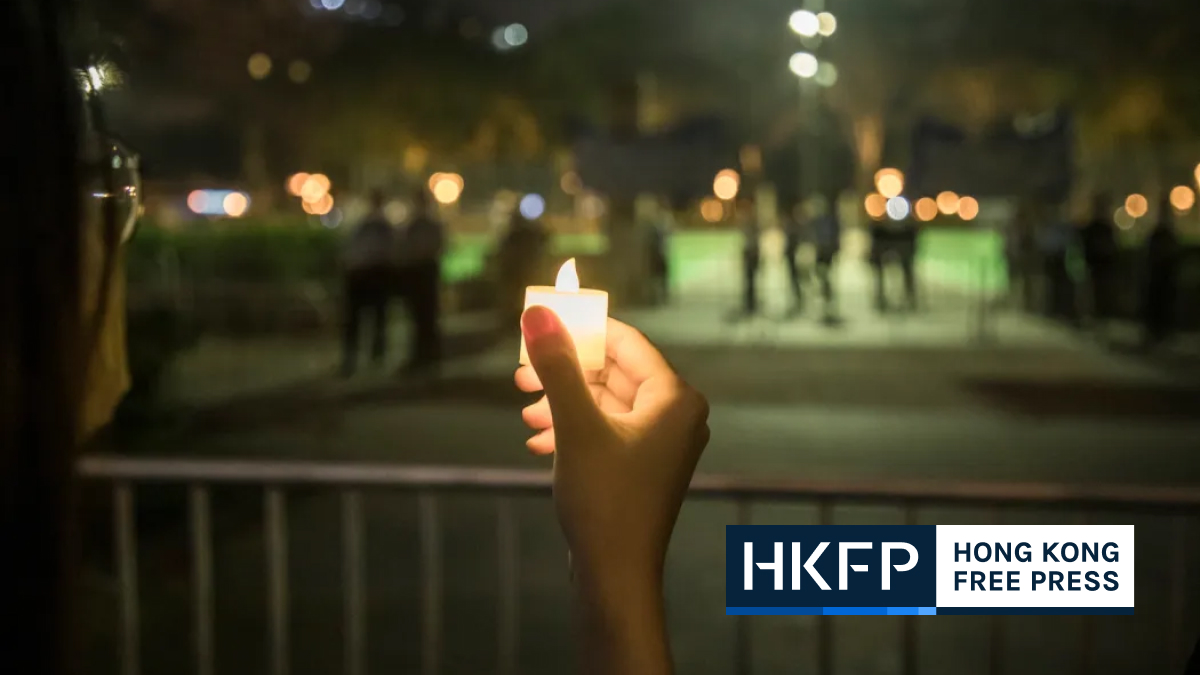
8th arrest for ‘sedition’ linked to Tiananmen crackdown anniversary posts under Hong Kong’s new security law

HKFP has an impartial stance , transparent funding , and balanced coverage guided by an Ethics Code and Corrections Policy .

Support press freedom & help us surpass 1,000 monthly Patrons : 100% independent, governed by an ethics code & not-for-profit.
Support HKFP | Code of Ethics | Error/typo? | Contact Us | Newsletter | Annual & Transparency Report

Irene Chan Senior Reporter
Irene Chan is a reporter at Hong Kong Free Press and has an interest in covering political and social change. She previously worked at Initium Media as chief editor for Hong Kong news and was a community organiser at the Society for Community Organisation serving the underprivileged. She has a bachelor’s degree in Journalism from Fudan University and a master’s degree in social work from the Chinese University of Hong Kong.
Irene is the recipient of two Society of Publishers in Asia (SOPA) awards and three honourable mentions for her investigative, feature and video reporting. She also received a Human Rights Press Award for multimedia reporting and an honourable mention for feature writing.
HKFP is a proud member of:

Latest Stories
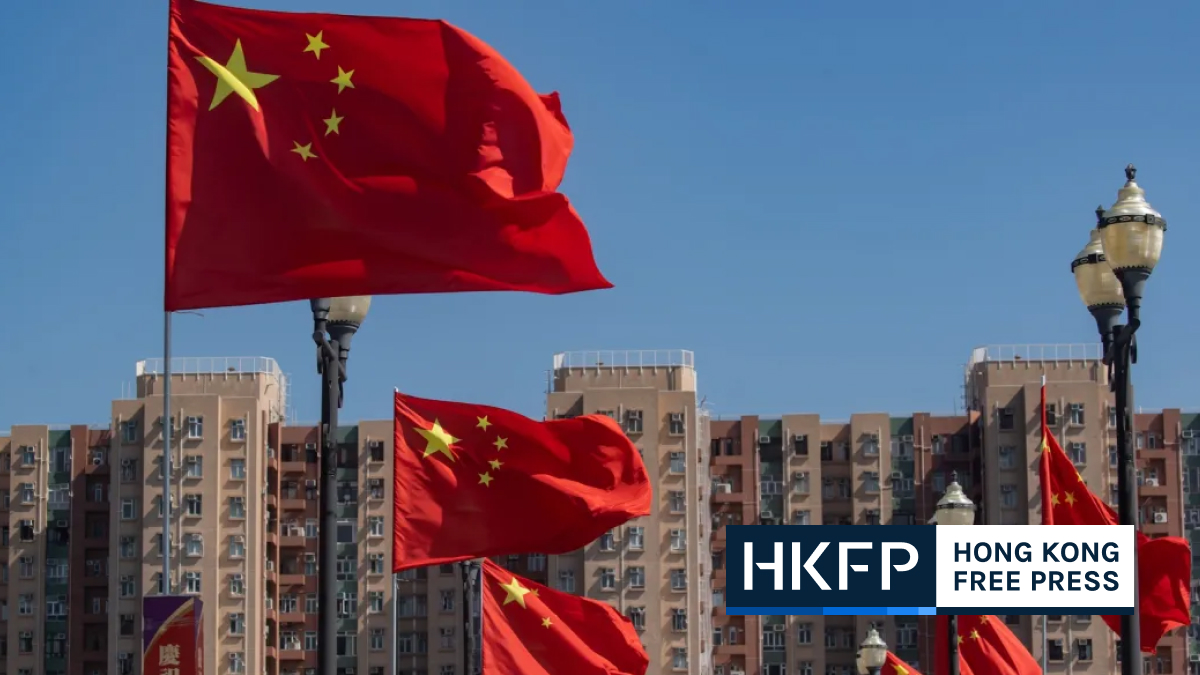
Beijing’s national security office in Hong Kong hits back at foreign condemnation of conviction of 14 democrats

HKFP’s trash point art shot wins Hong Kong Press Photographers Association prize

Hong Kong Christian newspaper runs blank front page ahead of Tiananmen crackdown anniversary

China defence minister says Beijing ready to ‘forcefully’ stop Taiwan independence

Zelensky says China working hard to ‘prevent’ countries from attending peace summit

Whispering death: Hong Kong requires electric vehicles to be installed with an audible alert – why can’t we hear it?
Something went wrong. Please refresh the page and/or try again.

features & interviews
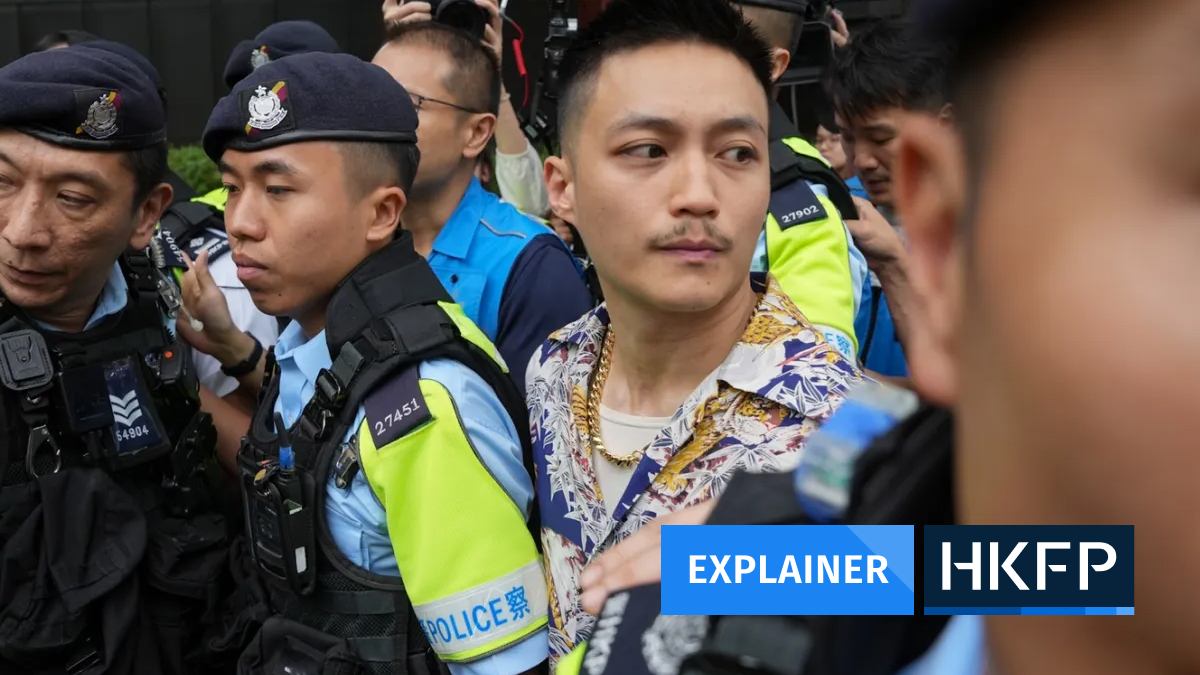
Explainer: Hong Kong’s national security crackdown – month 47
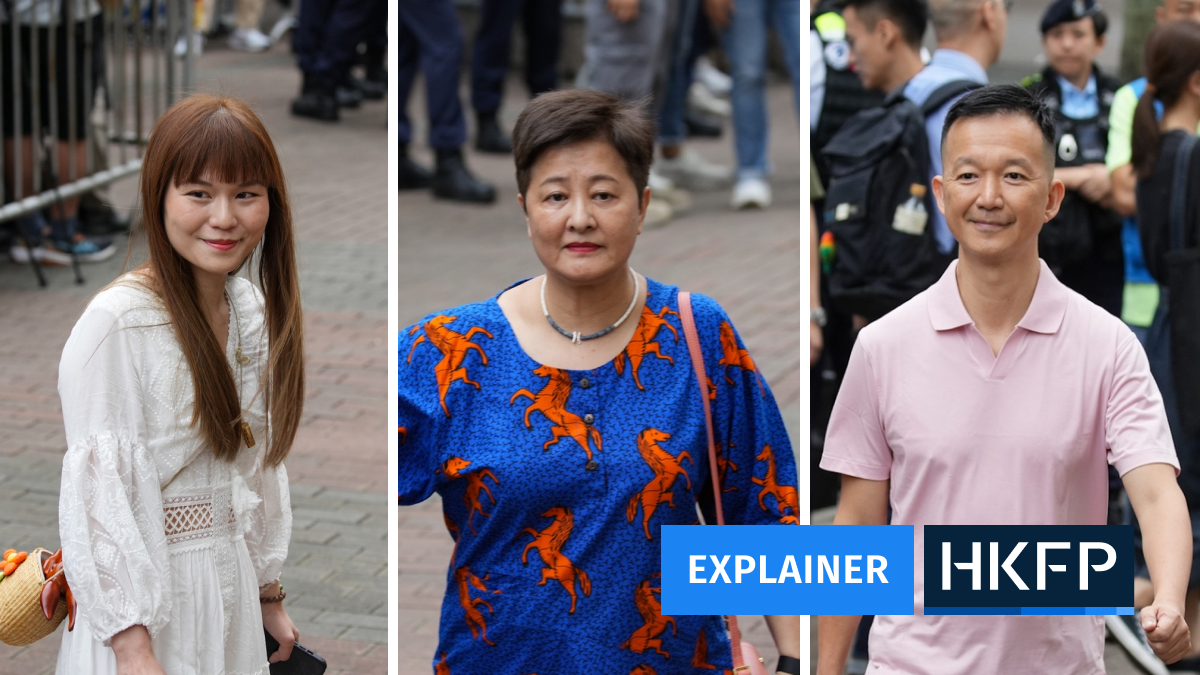
Hong Kong judges’ reasons for convicting 14 democrats of subversion conspiracy under national security law
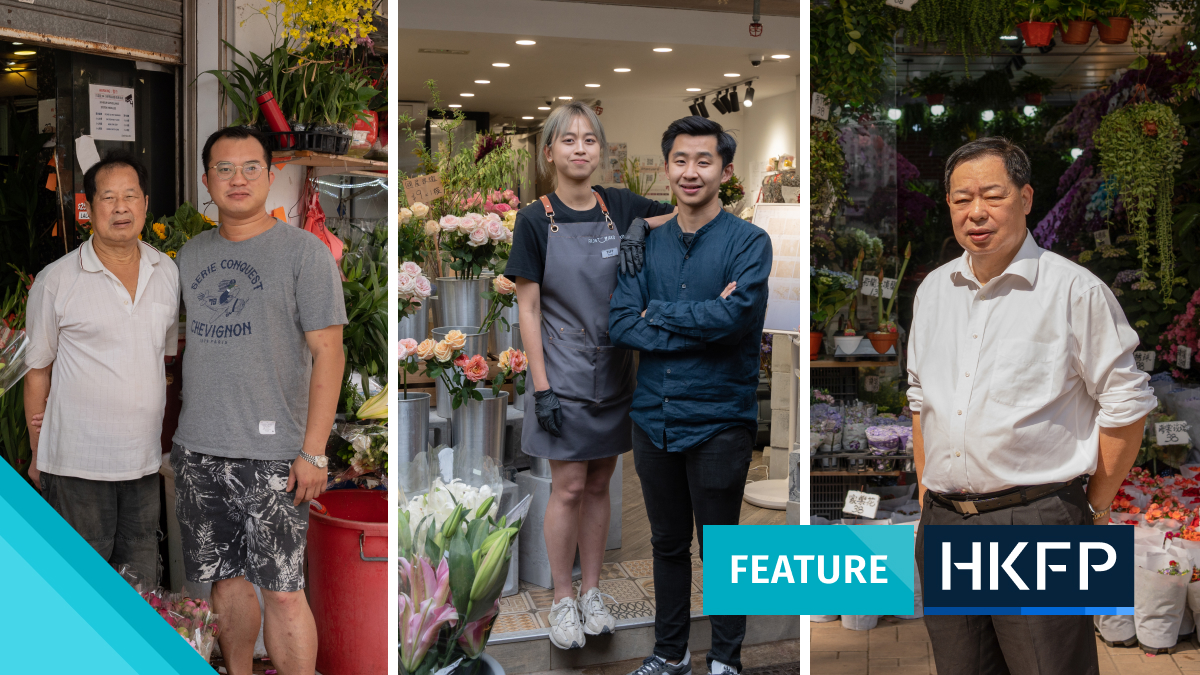
‘I just feel helpless:’ Why Hong Kong flower market florists are worried about a redevelopment plan – Part 2
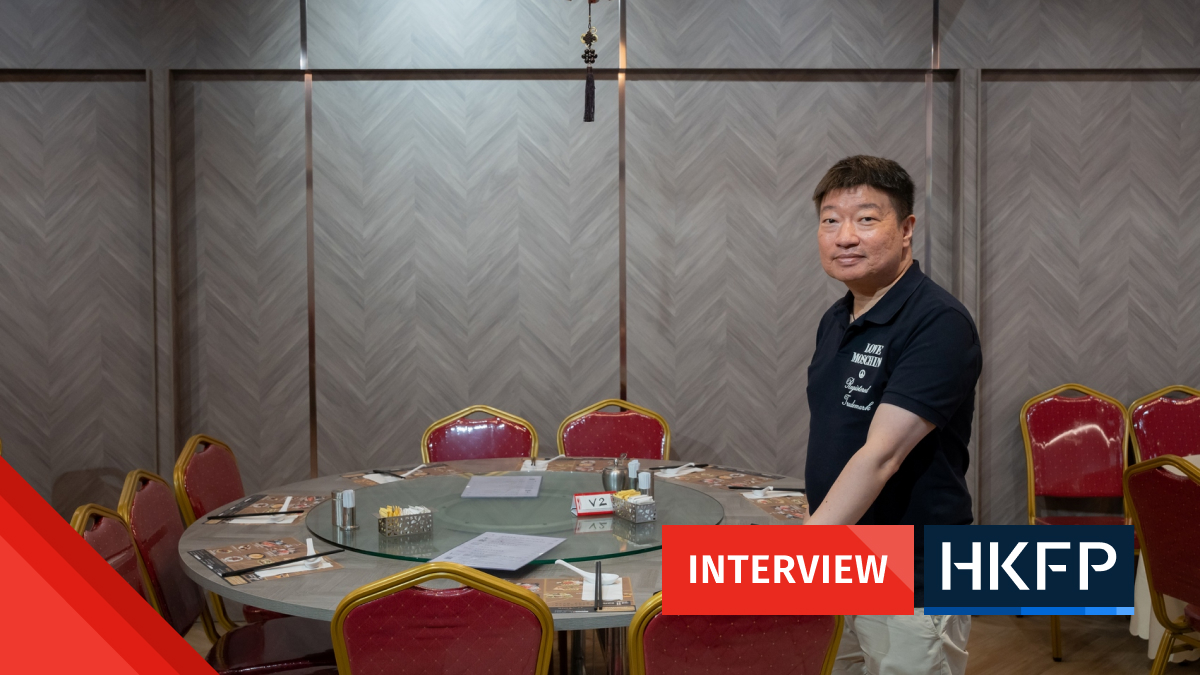
Hard to swallow: As restaurants across Hong Kong close, one eatery blames exodus for dwindling diners
Views expressed by opinion writers & advertisers are not necessarily shared by HKFP.
Where to find HKFP:
- HKFP Mobile Apps .
- HKFP Newsletter .
- HKFP Podcast .
- HKFP Facebook .
- HKFP Instagram .
- HKFP LinkedIn .
- HKFP Mastodon .
- HKFP Telegram .
- HKFP X/Twitter .
- HKFP YouTube .
- HKFP Apple News .
- HKFP Flipboard .
- HKFP News360 .
- HKFP Pushbullet .
- HKFP Whatsapp .
About HKFP:
- Advertise with HKFP .
- Announcements .
- Contact HKFP .
- Community Guidelines .
- Corrections Policy .
- Corrections Log .
- Documentary on HKFP .
- Freelance Charter .
- Newspaper Registration (periodical) .
- Policies, Ethics & Standards .
- Privacy, T's & C''s .
- Security Law .
- Staff Roster .
HKFP Partnerships:

Most-read stories today

About The Trust Project
The Trust Project is a collaboration among news organizations around the world. Its goal is to create strategies that fulfill journalism’s basic pledge: to serve society with a truthful, intelligent and comprehensive account of ideas and events.

China's tourists to spend nearly B35tn on holidays at home
Chinese tourists embarking on adventures closer to home are forecast to pump a record 6.79 trillion yuan (35 trillion baht) into the mainland economy this year - topping pre-pandemic levels for the first time.
Spending by domestic holidaymakers is expected to be 11% higher than 2019 - before the Covid pandemic stopped most travel, according to a report by the World Travel and Tourism Council and Oxford Economics.
'Chinese visitors are starting to travel again and this is only going to continue to grow,' said travel council president Julia Simpson. 'The tourism sector has shown signs of resilience and a strong recovery.'
Chinese holidaymakers are a driving force for the global tourism industry, with many countries keenly awaiting the return of travel and spending from the world's biggest market of travellers. In 2019, Chinese travellers made 170 million trips abroad and spent almost US$248 billion (9 trillion baht) overseas - making up 14% of global tourism spending, according to World Travel and Tourism Council data.
However, a backlog in processing visas in countries like the United States, and more expensive international flights, have kept Chinese holidaymakers closer to home, where they're flocking to cities for popular local delicacies such as spicy street foods and smaller towns in a 'reverse travel' trend shunning crowds.
Meanwhile, international visitors to China still haven't rebounded. Spending by foreign tourists on the mainland this year is expected to hit 715 billion yuan, about a quarter below 2019 levels. China was one of the last big economies to re-open its borders and inbound flights to the country haven't fully returned.
In recent months, China has loosened visa restrictions for visitors from Thailand, Malaysia and Singapore, along with some European countries and cruise ship passengers, in a bid to boost both inbound tourism and investment. At the beginning of the year, Beijing said it had eased visa requirements for 11 countries since July 2023.
China reported 82 million tourist arrivals last year - about 56% of the 2019 level, according to the country's National Bureau of Statistics. The number of visits made by people from outside of Hong Kong and Macau was just 13.8 million, lagging pre-Covid figures by around 57%.
And even as the country's economy has weakened and retail spending remained sluggish, travel is one of the stronger consumption categories, according to Morgan Stanley. The tourism and travel sector broadly supported 80 million tourism and travel jobs this year, about 2% below 2019, according to the report.
China’s Golden Week Travel Signals a Revival. Plus, Why U.S. Travel Is Still Lagging
Peden Doma Bhutia , Skift
May 30th, 2024 at 12:42 AM EDT
China’s outbound travel is coming back, driven by favorable visa policies, increased airline capacity, and a growing interest in diverse global destinations. However, challenges remain, particularly in travel to the U.S.
Peden Doma Bhutia
In a rebound of international travel, over 1.5 million Chinese citizens embarked on outbound trips during the recent Golden Week holiday , marketing technology firm China Trading Desk told Skift.
This surge points to a significant revival in global travel following the easing of pandemic-related restrictions.
The relaxation of visa policies between China and several countries has played a crucial role in this uptick. During the Golden Week in late April and early May, the growth rate of inbound and outbound bookings outpaced domestic tourism, Trip.com Group told Skift.
Popular Destinations and Emerging Trends
According to data from Trip.com Group, Chinese tourists visited nearly 200 countries and over 3,000 towns worldwide during the Golden Week period.
Thailand emerged as the top destination, with over 215,000 Chinese tourists between April 27 and May 4, according to China Trading Desk’s data. Factors such as visa-free entry offer by Thailand, shorter flight durations, and cost-effectiveness compared to other destinations have driven this trend.
While strong, the numbers still haven’t reached pre-pandemic levels, said Subramania Bhatt, CEO of China Trading Desk.
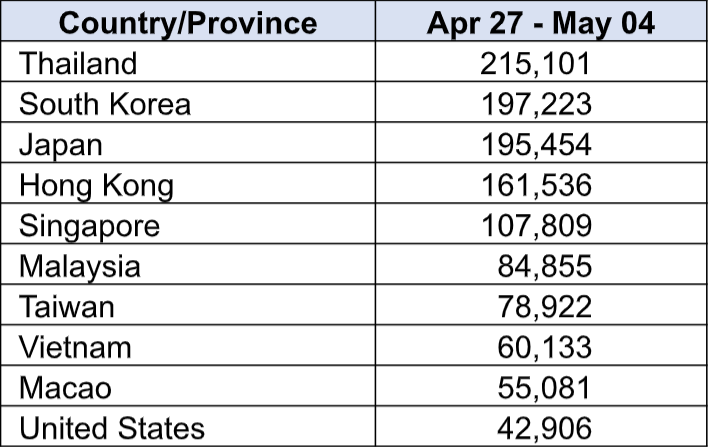
The popularity of outbound travel is further evidenced by Ctrip’s report of a 190% year-on-year increase in the number of outbound tourists. Alibaba’s Fliggy also noted a near doubling in outbound travel bookings during the five-day holiday, with per capita spending on outbound travel surpassing 2019 levels significantly.
Alipay transactions reflect this increased spending, with a 77% rise in overseas markets during the initial days of Golden Week, particularly in destinations like Thailand and Malaysia.
Challenges in US-China Travel
Travel to the U.S. still faces hurdles , with flight capacity between the two countries around 25% of pre-Covid levels. During the 2019 Labor Day holiday, 70,000 travelers journeyed from China to the U.S., but most recently it was around 42,000.
Bhatt cited several reasons for this:
- Limited Flight Availability: There’s a slower resumption of direct flights and connectivity between China and the US, impacting the ease of planning trips.
- Visa Processing Delays: Longer visa processing times have been a deterrent, likely due to staffing issues and backlogs caused by the pandemic.
- Geopolitical Tensions: Ongoing political tensions between China and the US may make some potential travelers hesitant.
- Concerns Over Racial Treatment: There is apprehension about the treatment of Chinese individuals in the U.S., which can influence travel decisions.
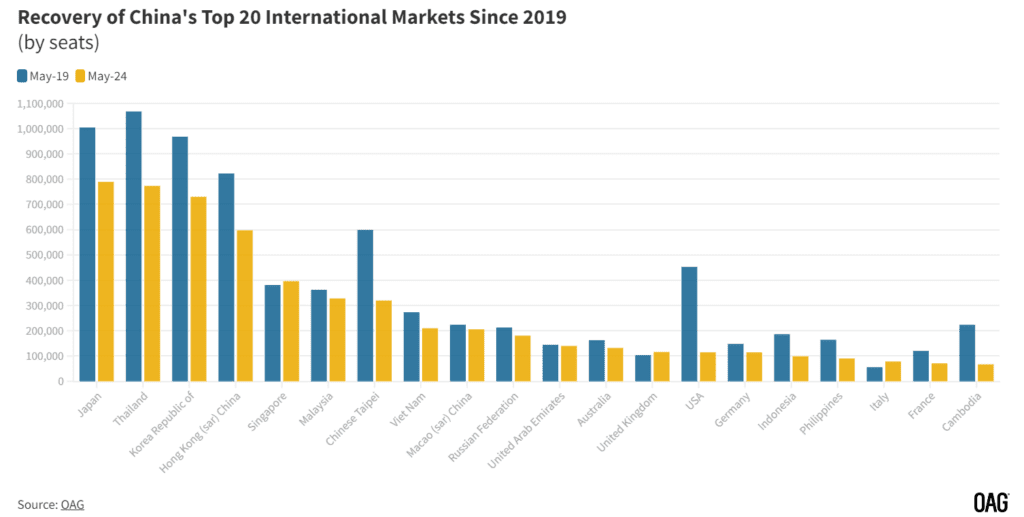
Airline Capacity and Pricing Trends
Though limited, there has been a gradual restoration of airline service and that has helped. Fliggy said that the average price per person for international air tickets dropped by more than 10% compared to the previous year.
The preference for Asian destinations remains strong, with 9 out of the top 10 outbound destinations being in Asia. Bhatt attributed this to the ease of travel, increased flight availability, and visa-free access in many Southeast Asian countries, as well as Hong Kong, Taiwan, and Macau.
Europe continues to attract Chinese tourists, with over 100,000 travelers heading to European countries excluding the UK during the holiday season, according to China Trading Desk’s data. Trip.com reported notable increases in travel to Spain, Turkey, Austria, Slovenia, Italy, and Georgia, with year-on-year growth exceeding 1.5 times.
Domestic capacity in May still accounts for 92% of all seats to, from and within China this month, with international making up the remaining 8%, according to aviation data firm OAG .
Shifts in Travel Preferences
There is a notable shift towards exploring less traditionally frequented destinations. Austria, Turkey, Morocco, and other less traditionally frequented destinations by Chinese tourists saw the fastest growth rates in bookings, indicating a shift towards exploring new and diverse destinations
Fliggy also reported that bookings for long-distance travel to places like Austria, Turkey, Morocco, Russia, Portugal, Georgia, Egypt, Spain, Kazakhstan, and Brazil quadrupled compared to the previous year.
Additionally, Trip.com group noted significant increases in travel to Middle Eastern destinations such as Oman, Saudi Arabia, and Kuwait, with numbers more than tripling year-on-year.
Saudi Arabia and Qatar are set to increase the number of direct flights connecting China and Hong Kong, capitalizing on the resurgence of Chinese tourists. Having welcomed 140,000 Chinese tourists last year, Saudi Arabia aims to attract 5 million Chinese visitors by 2030.
The Daily Newsletter
Our daily coverage of the global travel industry. Written by editors and analysts from across Skift’s brands.
Have a confidential tip for Skift? Get in touch
Tags: alibaba , alipay , asia monthly , china , china airlines , china outbound , coronavirus recovery , ctrip , fliggy , golden week , trip.com group
Photo credit: Fliggy reported that bookings to Turkey, Morocco, Georgia, Egypt and Kazakhstan have quadrupled compared to the previous year. Rachel Claire / Pexels
- Avolta-stock
- News for Avolta
- Avolta Expands Footprint in Greater China with New Travel Retail Contract; Opens its First Duty Free Stores at Hong Kong – Macau Ferry Terminal
Avolta Expands Footprint in Greater China with New Travel Retail Contract; Opens its First Duty Free Stores at Hong Kong – Macau Ferry Terminal
End of Media Release
1914833 30.05.2024 CET/CEST
Avolta News MORE
Related stocks.

IMAGES
VIDEO
COMMENTS
Entry Requirements. Passports & Visas Customs Embarkation Fee. All visitors must hold a passport or a valid travel document for travel to Macao. All visitors are required to have a visa except nationals of countries which are exempted from a visa or entry permit. For more information on "Visa" and "Entry Permit" Exemption, please visit ...
Macau entry restrictions explained. August 6, 2020. The Hong Kong Special Administrative Region Government today urged the public to ensure that they comply with Macau's new COVID-19 nucleic acid test requirement before travelling there. According to the announcement made by Macau's Novel Coronavirus Response & Co-ordination Centre, starting ...
Further information on travel to and around the PRC is available on our China International Travel Information and Hong Kong International Travel ... U.S. Consulate General Hong Kong & Macau is unable to represent you in a legal matter. ... Rapid COVID-19 tests are readily available at pharmacies and retail establishments throughout Macau ...
FCDO travel advice for Macao. Includes safety and security, insurance, entry requirements and legal differences. ... COVID-19 rules. There are no COVID-19 testing or vaccination requirements for ...
Rules for Macau returnees revised. In the light of Macau's latest COVID-19 epidemic development, people who have stayed in Macau on the day of arrival in Hong Kong or during the 14 days before that day will not be eligible to return to Hong Kong via the Return2hk Scheme. The Macao Special Administrative Region Government announced today that ...
COVID-19 in China, Hong Kong, and Macau . Level 4 - Avoid All Travel. Level 3 - Reconsider Nonessential Travel. Level 2 - Practice Enhanced Precautions. Level 1 - Practice Usual Precautions. This notice has been removed. For all current travel notices, please visit the travel notices page. Page last reviewed: March 10, 2023.
China has announced it will completely reopen its borders with the territories of Hong Kong and Macau, dropping COVID-19 testing requirements and daily quotas after nearly three years of closure.
Restaurants in Macau are open. Bars in Macau are . Find continuously updated travel restrictions for Macau such as border, vaccination, COVID-19 testing, and quarantine requirements.
The testing fee is HK$388. Service hours: 0700hrs - 2359hrs Medical centre location: 6T104, L6, Terminal 1 (accessed by elevator near L7 departures level Aisle A) Telephone: +852 2261 2626. Hong Kong International Airport (HKIA) is committed to safeguarding the airport and the well-being of our passengers and staff.
China said on Friday that cross border travel between the mainland, Hong Kong and Macau would fully resume from Feb. 6, dropping existing quotas and scrapping a mandatory COVID-19 test that was ...
TurboJET ferry services between Macau's Taipa Ferry Terminal and Hong Kong International Airport's Skypier will resume on 30 December. The high-speed ferry service between downtown Hong Kong and Macau is also poised for a return. Ferry services between the two SARs, including the airport route, were suspended in February 2020 due to the ...
International arrivals to Macau, including from Hong Kong and Taiwan, will no longer need to undergo a nucleic acid test after landing and will be able to move freely, the government said on ...
All eligible travelers should be up to date with their COVID-19 vaccines. Please see Your COVID-19 Vaccination for more information. COVID-19 vaccine. Hepatitis A. Recommended for unvaccinated travelers one year old or older going to Macau. Infants 6 to 11 months old should also be vaccinated against Hepatitis A.
If you plan to travel between Macao, Hong Kong and mainland China make sure you apply for a visa allowing multiple entries. Useful links. Entry and Exit of Non-residents - Public Security Police Force of Macao; ... COVID-19. Coronavirus disease (COVID-19) is an infectious viral disease. It can spread from person to person by direct contact and ...
TRAVEL RESTRICTIONS IMPOSED IN MACAO . With effect from 6 February 2023, travellers aged 4 and above entering Macao from mainland China, Hong Kong or Taiwan regions, or entering Hong Kong from Macao will not need to present any proof of COVID-19 testing. Travellers must take the manual inspection channels and are not allowed to take the vehicle ...
Call us in Washington, D.C. at 1-888-407-4747 (toll-free in the United States and Canada) or 1-202-501-4444 (from all other countries) from 8:00 a.m. to 8:00 p.m., Eastern Standard Time, Monday through Friday (except U.S. federal holidays). See the State Department's travel website for the Worldwide Caution and Travel Advisories.
Complete COVID-19 vaccination before travel according to the latest recommendations to effectively protect against COVID-19 disease (For details on COVID-19 vaccination, ... If feeling unwell when outside Hong Kong, especially if experiencing respiratory symptoms, wear a well-fitted surgical mask and seek medical advice at once. ...
Inbound persons arriving from the Mainland or Macao. Inbound persons arriving from Taiwan or places outside China. All pre-departure and post-arrival quarantine and testing requirements have been removed. All pre-departure and post-arrival quarantine and testing requirements have been removed. All inbound persons must pass temperature checks ...
HONG KONG, Oct 31 (Reuters) - Macau authorities reinstated tough COVID-19 curbs including locking down a major casino over the weekend after a handful of cases were detected, even as China ...
Travelling between Hong Kong, Macao or China and returning to one of the territories constitutes a multiple journey. To enter Hong Kong and Macao you must possess a passport that is valid for at least one month beyond the date of your intended stay, adequate funds to cover your stay and evidence of onward/return transportation.
Travellers are advised to refer to the official Macao SAR COVID-19 website for the relevant anti-epidemic measures before departing for Macao.. Singaporeans can visit Macao for up to 30 days without a visa. If you plan to stay more than 30 days, you will need to obtain an extension from the Macao Immigration Department. If you plan to work or study in Macao, you must obtain a visa prior to ...
Safety. The Hong Kong Government strictly controls demonstrations. Authorities may arrest protesters. Avoid protests and large gatherings. Don't photograph or video protests. Violent crime is rare, but some petty crime happens. Thieves target tourist spots and crowded places, such as markets and trains. Take care of your belongings.
Hong Kong Free Press HKFP. Hong Kong news, breaking updates - 100% Independent, impartial, non-profit
Life insurance sales in Hong Kong surged by 39 per cent in the first quarter thanks to a world record policy sold by HSBC Life and strong growth in the number of mainland Chinese visitors buying ...
Spending by domestic holidaymakers is expected to be 11% higher than 2019 - before the Covid pandemic stopped most travel, according to a report by the World Travel and Tourism Council and Oxford ...
Travel to the U.S. still faces hurdles, with flight capacity between the two countries around 25% of pre-Covid levels. During the 2019 Labor Day holiday, 70,000 travelers journeyed from China to ...
Avolta Expands Footprint in Greater China with New Travel Retail Contract; Opens its First Duty Free Stores at Hong Kong - Macau Ferry Terminal 30.05.2024 / 18:00 CET/CEST Avolta, the leading ...